Agriculture & Environment
Mak Climate Conference Calls for Africanizing Global Resilience Discourses
Published
1 year agoon
By
Jane Anyango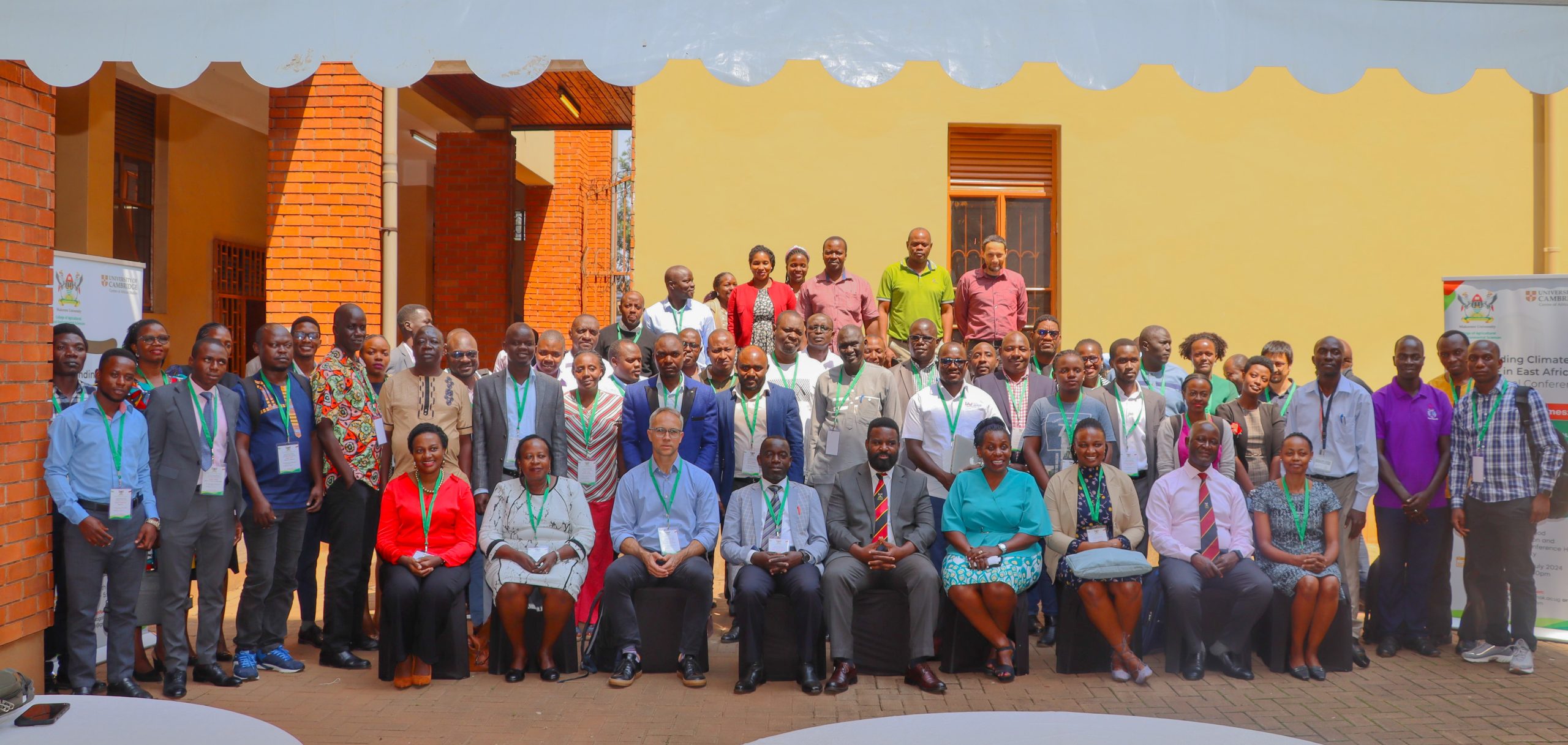
The International Climate Change Conference held at Makerere University has sparked significant discussions on the need to tailor global climate resilience and adaptation strategies to fit the African context.
The conference, themed, ” Grounding Climate Change in East Africa,” brought together Over 100 participants from eight universities in East Africa and the diaspora encompassing natural scientists, social scientists, humanities, medical, law and art scholars as well as Government ministries and agencies, the private sector and civil society organistaions to debate and propose solutions for the pressing climate issues facing East Africa.
Funded by University of Cambridge in the US, the two day conference (25th -26th July 2024) was convened by Makerere University’s Department of Environmental Managemnet in conjunction with University of Cambridge spearheaded by Prof. Justine Namaalwa , Dr. Patrick Byakaga and Adam Branch.
The conference underscored the urgent need to reframe global climate strategies to better suit African realities. Integrating local knowledge, mainstreaming climate issues across disciplines, enhancing collaboration between academia and practitioners, and valuing cultural perspectives provide a comprehensive roadmap for effective climate action in East Africa. The participants call for immediate and sustained efforts to implement these resolutions to address the climate crisis effectively.
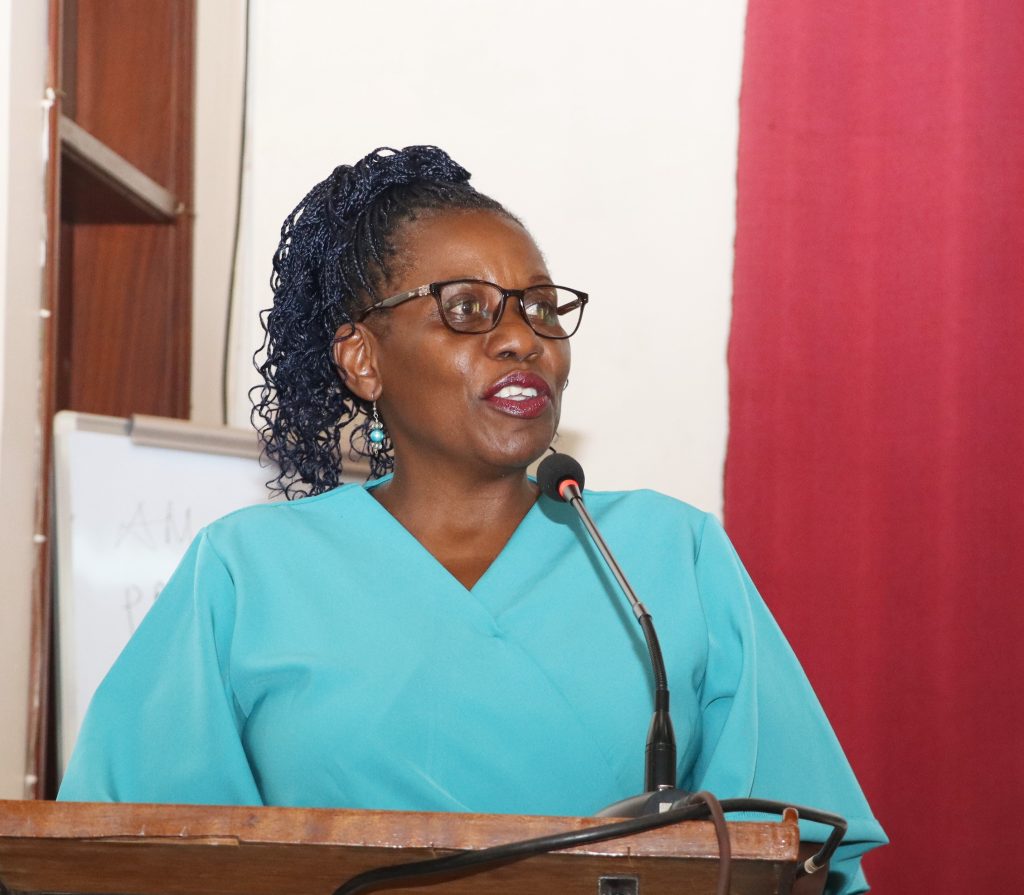
While officially opening the conference at Makerere University CEDAT Conference room, the Deputy Vice Chancellor in charge of Academic Affairs, represented by Dr. Robert Wamala, emphasized the collaborative effort between Makerere University and the University of Cambridge as a significant milestone in addressing global climate challenges.
Dr. Wamala noted that Africa is the most vulnerable continent to climate change due to its limited adaptive capacities. “The continent faces increasing climate extremes like droughts and floods, exacerbating poverty and destroying livelihoods,” he said. He highlighted the dire predictions for East Africa, mentioning significant impacts on agriculture, health, infrastructure, and businesses.
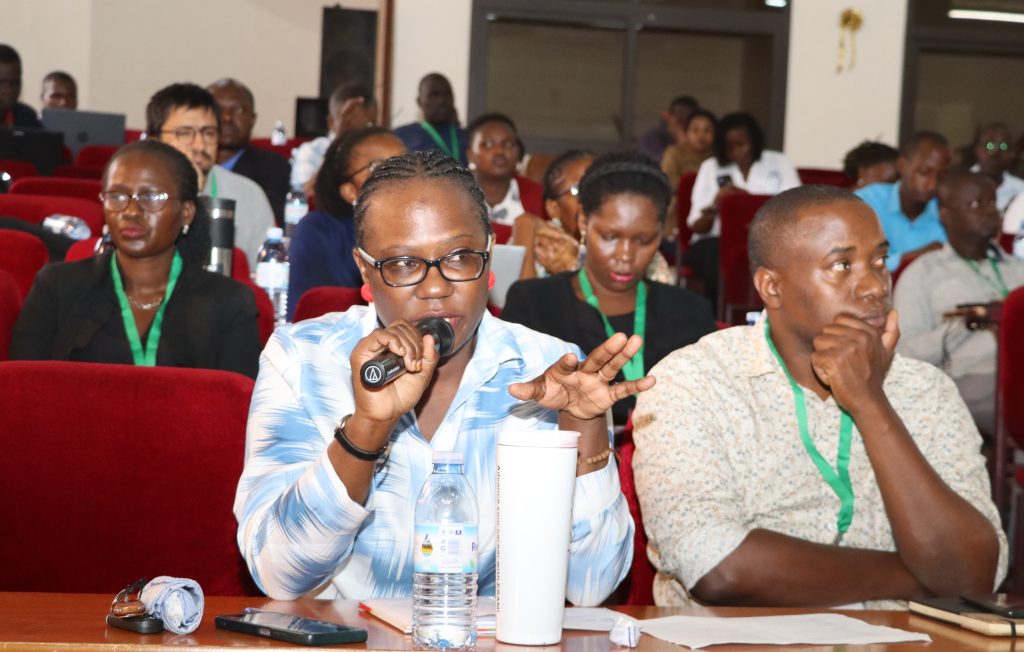
“Climate change is recognized as a constraint limiting East Africa’s efforts to attain many critical sustainable development goals,” Wamala added, stressing the urgency for sustainable solutions amid rising conflicts and insecurity in drought-prone areas.
The conference aims to foster meaningful dialogue and explore innovative solutions to climate change. Dr. Wamala encouraged active participation from attendees, stating, “We all shall be able to shape the conversations on climate change based on our unique experiences, insights, and knowledge.”
He highlighted three key themes for the conference: Africanizing global discourses of resilience and adaptation, Deepening climate justice from East African perspectives, and Grounding climate actions by addressing constraints and building momentum. “These themes encapsulate the manifest nature of climate change and the need for knowledge when exploring opportunities for effectively addressing the challenge,” he explained.
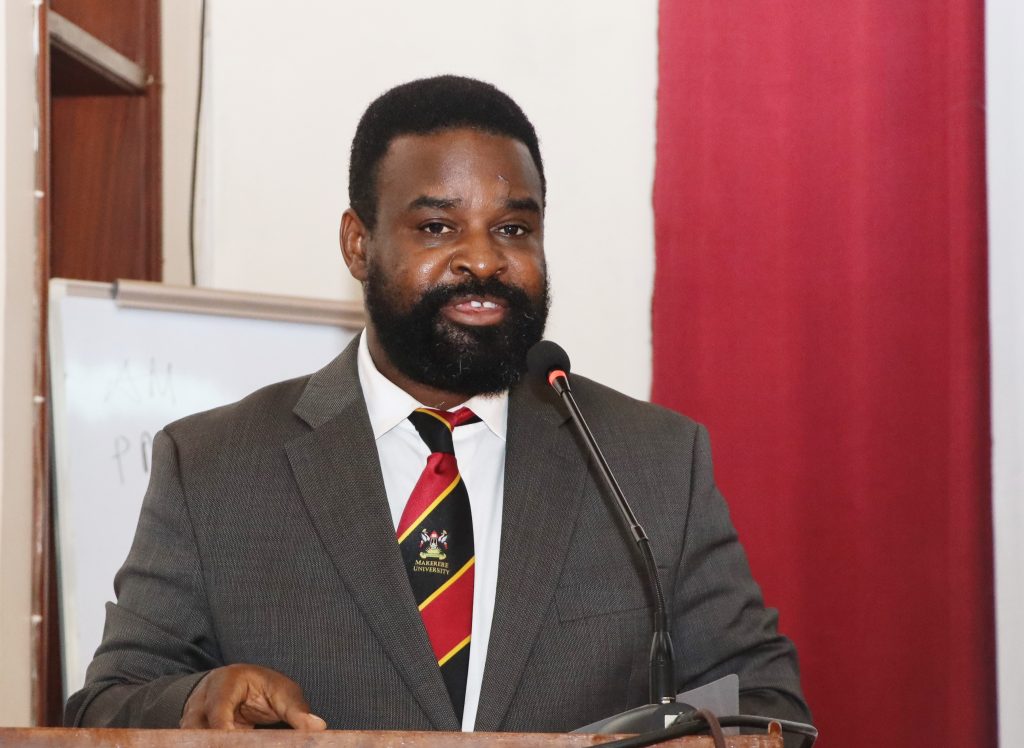
Dr. Wamala concluded by expressing gratitude to the Department of Environmental Management and international partners, reaffirming Makerere University‘s commitment to addressing global challenges. “Together, let us interrogate the complexities of climate change and trigger discussions on tangible actions that will shape a sustainable future,” Dr. Wamala urged.
Co-Convener Highlights the Power of Collaboration in Addressing Climate Change
Representing the Principal of the College of Agricultural and Environmental Sciences, Co-Convener Assoc. Prof. Justine Namaalwa, who is also Chair of the Department of Environmental Management, emphasized the critical role of academic institutions in tackling climate change. Namaalwa underscored that the conference represents a culmination of the college’s mandate to advance research and education in agricultural and environmental sciences.
Prof. Namaalwa praised the collaborative spirit of the conference, noting, “This event is a testament to the power of collaboration and our shared vision to address the pressing issue of climate change in our region.” She highlighted the diverse range of participants, including academics, government officials, and private sector representatives, all coming together with the common goal of enhancing understanding and shaping effective climate actions tailored to East Africa.
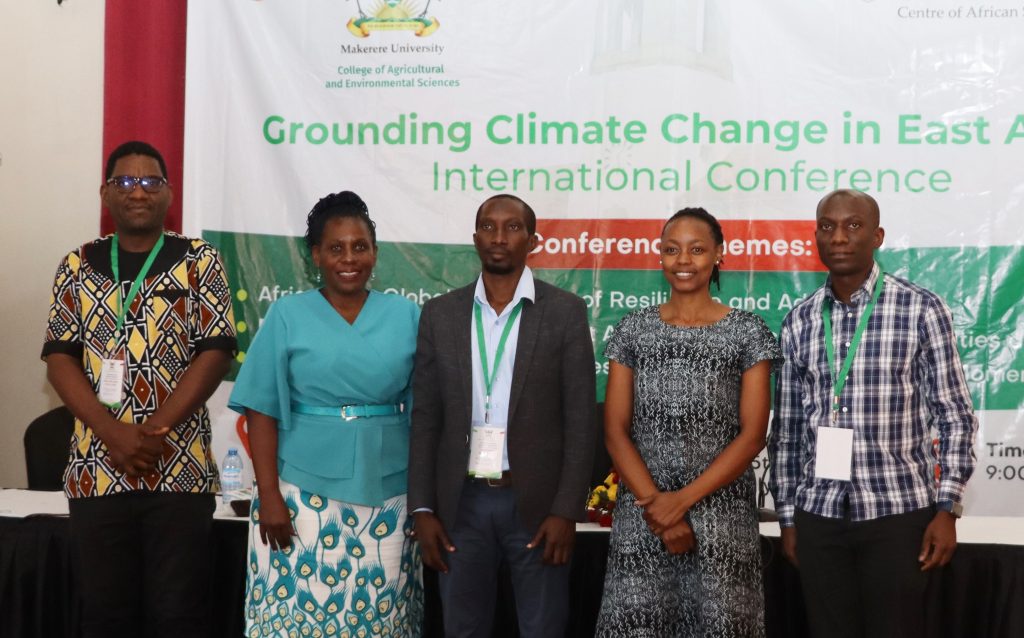
She expressed her gratitude towards the leadership of Makerere University and the Centre of African Studies at the University of Cambridge for their significant contributions. “Our appreciation goes to our esteemed partners at the Centre of African Studies, University of Cambridge. Your invaluable partnership and mutual respect have been instrumental in making this conference a reality,” Prof. Namaalwa stated.
Addressing the conference attendees, Namaalwa called for a multidisciplinary approach to climate change. “Climate change is a multifaceted issue that intersects with various fields, including environmental science, agriculture, economics, law, medicine, sociology, and public policy. By integrating insights from these diverse disciplines, we can develop comprehensive and effective actions tailored to our region’s specific needs.” she said.
She urged participants to focus on opportunities for innovation and progress. “The challenges posed by climate change are immense, but so are the opportunities for innovation. Let us emphasize the potential for positive change and work together to build resilient communities, protect our ecosystems, and foster sustainable development.”
In conclusion, Prof. Namaalwa expressed confidence that the conference would act as a catalyst for meaningful action and new partnerships. “I am confident that this conference will inspire new initiatives and collaborations aimed at addressing climate change effectively. Let us seize this opportunity to exchange ideas, share best practices, and forge lasting collaborations for a better future.”
Calls for Unified Climate Research, Localized Solutions, and Redefining Global Models
The Head of African Studies at the University of Cambridge, Prof. Adam Branch outlined three main intellectual and institutional goals for the “Grounding Climate Change in East Africa” conference, emphasizing the need to address fragmentation in climate research, political transformations driven by climate discourse, and the influence of Western-dominated climate models.
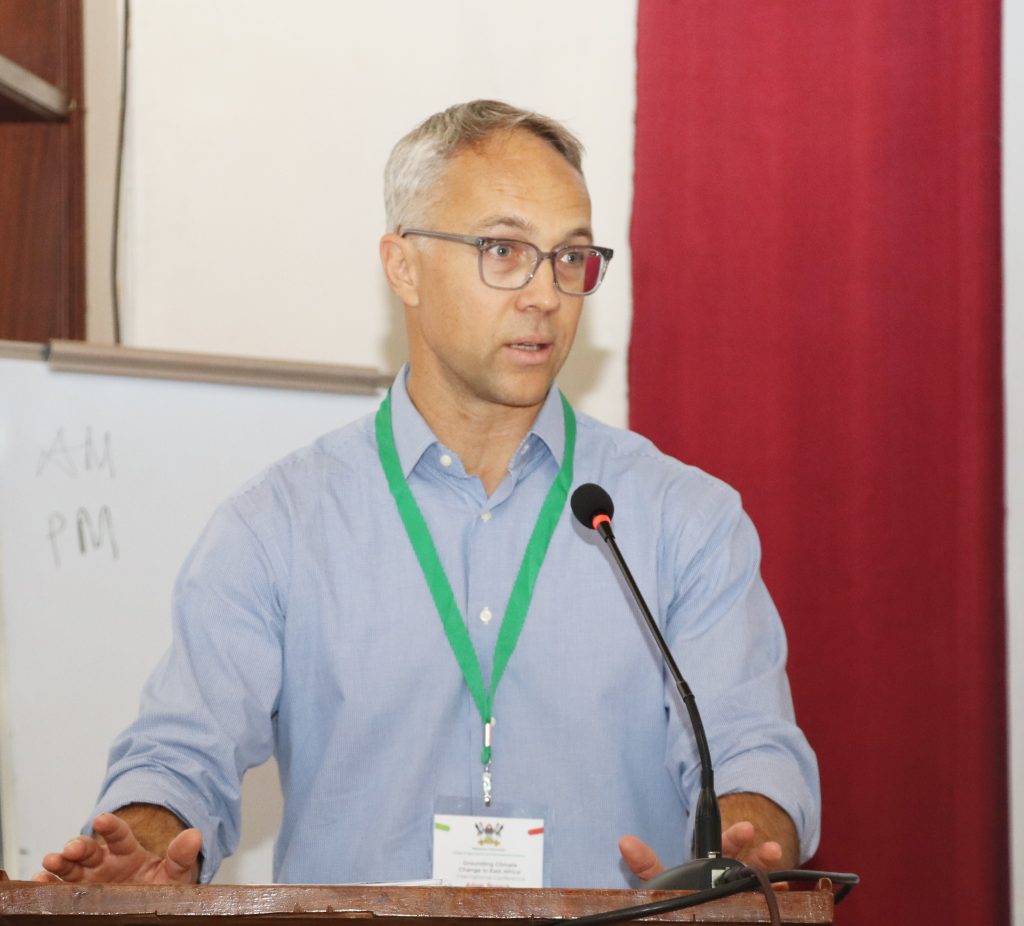
Prof. Branch pointed out the fragmentation in climate change research driven by donor priorities. He explained that much of the current research is conducted under varied agendas and lacks coordination among different disciplines and institutions. “The conference aims to bring together researchers from various disciplines and universities to build common agendas, discuss shared challenges, and address the fragmentation caused by donor-driven priorities,” he said.
Branch addressed the political and social transformations triggered by climate change discussions. He noted that climate change is driving significant shifts in policies, institutional changes, and civil society agendas. “Given the broad impacts of climate change, it is crucial to create a platform where civil society, activists, academics, practitioners, and political leaders can reflect on these changes and collaborate on navigating the evolving political and social landscape,” Prof. Branch stated.
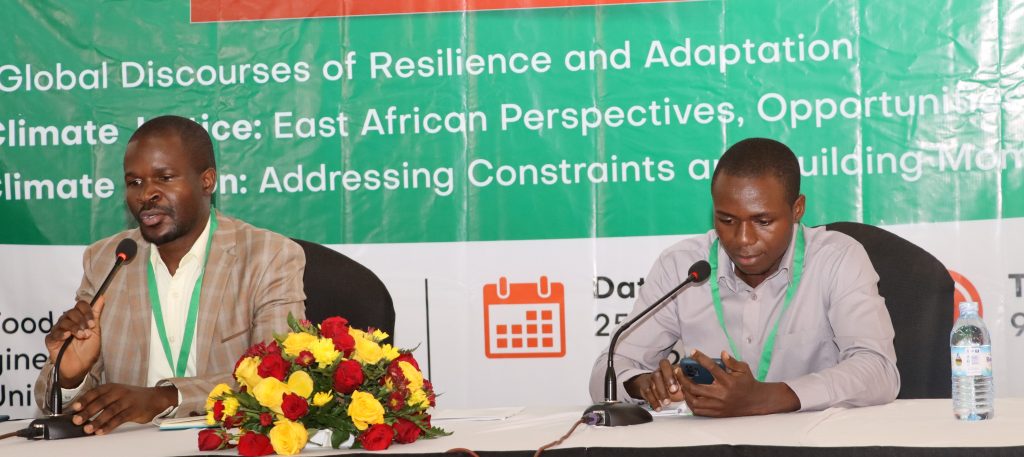
Prof. Branch also discussed the need to challenge the dominance of Western climate models and agendas. He highlighted concerns about the relevance of global climate policies and models to African contexts, emphasizing that these frameworks often overlook Africa’s environmental histories and adaptation practices. “To ensure that climate actions are relevant and effective, we must ground climate change discussions in African environmental histories and needs, driven by African researchers. This approach will help avoid perpetuating climate injustice and promote genuine environmental justice,” he asserted.
He concluded by reaffirming the importance of the conference in addressing these key issues, fostering interdisciplinary collaboration, and ensuring that climate strategies are tailored to the unique needs and histories of African societies.
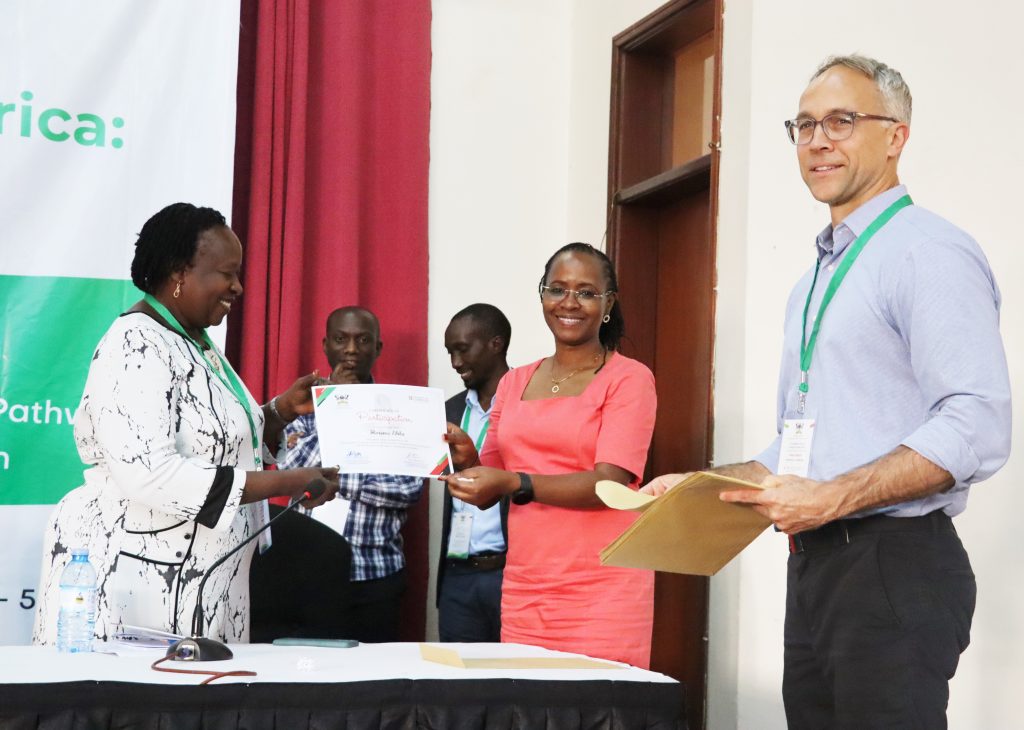
Conference Highlights Multidisciplinary Approaches to Climate Change
The conference, held over two days, explored three core themes: Africanizing global discourses of resilience and adaptation; Deepening climate justice with East African perspectives, and Grounding climate actions by addressing constraints and building momentum.
The conference attracted eight universities in East Africa and beyond including Gulu University, Makerere University, University of Cambridge, Uganda Martyrs University Nkozi, University of Dodoma, University of Dar es Salaam, Lira University, and Addis Ababa University. A total of 28 scholarly papers were presented, alongside three keynote speeches and six panel discussions.
During the opening, agenda setting and overview roundtable, Prof. Justine Namaalwa emphasized the critical role of research in shaping climate actions. Dr. Patrick Byakagaba discussed the importance of harnessing synergies between universities and civil society organizations for climate resilience and justice.
Byakagaba emphasized the multifaceted nature of climate justice, stating, “Climate change disproportionately impacts vulnerable populations, and achieving climate justice means addressing these disparities. It involves not only fair distribution of costs and benefits but also correcting historical wrongs.” He explained that climate justice is deeply intertwined with both distributive justice—where wealthier nations shoulder more responsibility—and corrective justice, which seeks to address past inequities.
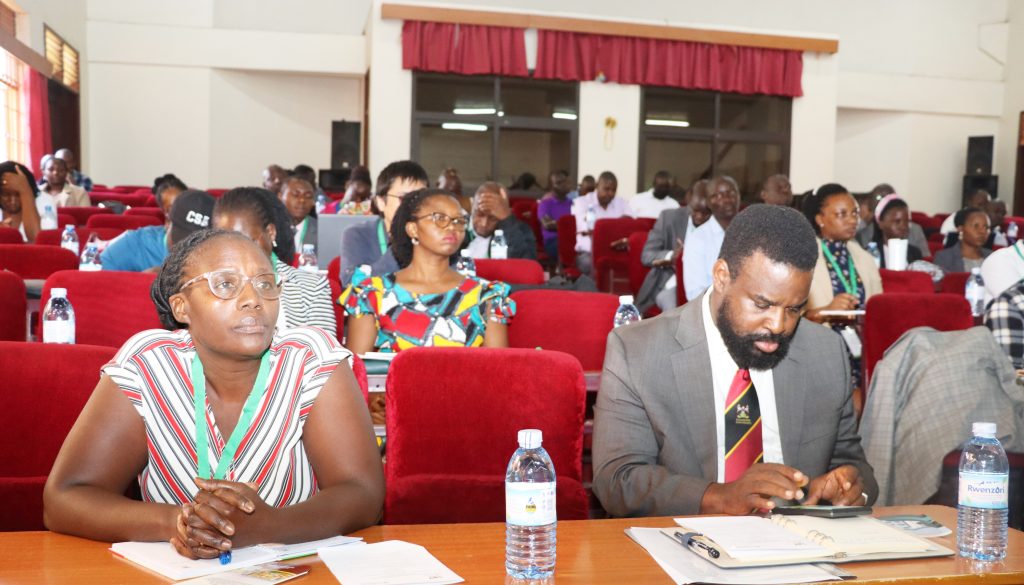
Byakagaba highlighted the growing involvement of civil society organizations (CSOs) and governments in adopting climate justice perspectives. “while some Global South nations are enacting climate laws that incorporate human rights and intergenerational considerations, successes in climate litigation have been sparse.” This is often due to the technical challenge of proving causal links between human activities and localized climate impacts. He stressed that “robust evidence from technical experts, often based in universities, is essential to support these legal claims.”
Universities, once considered detached from real-world problems, are increasingly aligning their research with societal needs and community priorities. Dr. Byakagaba noted, “The collaboration between universities and CSOs is crucial. Universities have the research capabilities to provide actionable insights, while CSOs offer on-the-ground perspectives and practical experience.” This partnership is seen as a vital strategy for developing and implementing effective climate-resilient interventions.
Policy advocacy for climate justice relies heavily on rigorous, objective research. Dr. Byakagaba explained, “Countries with strong climate laws often have advisory committees that include technical experts from academia and civil society. These committees are vital for shaping and implementing effective climate strategies.” However, many regional and local governments in East Africa still face challenges in creating actionable climate plans.
Addressing barriers to effective university-CSO partnerships—such as power imbalances and differing timelines—requires significant reform. Dr. Byakagaba concluded, “Overcoming these challenges will necessitate a shift in mindset within both universities and CSOs. Strong collaborations between these institutions can drive meaningful climate action and address the pressing challenges of climate change.”
Additionally, Adam Branch and Dr. Florence Ebila presented on extending the climate change debate and engendering climate change action, respectively.The conference featured three keynote addresses. Mathew Bukhi Mabele from the University of Dodoma presented on “Green Extractivism and a Surging Commodity Frontier in African Carbon Forestry.” On the second day, Laury Ocen delivered a keynote on “Framing Climate Security within the Historical Lenses of Oral Texts,” while Aaron Werikhe and Kimono Jamil from the Ministry of Finance and the Ministry of Water and Environment discussed “Mainstreaming Climate Change in National and Local Government Budgets in Uganda: Opportunities and Challenges.”
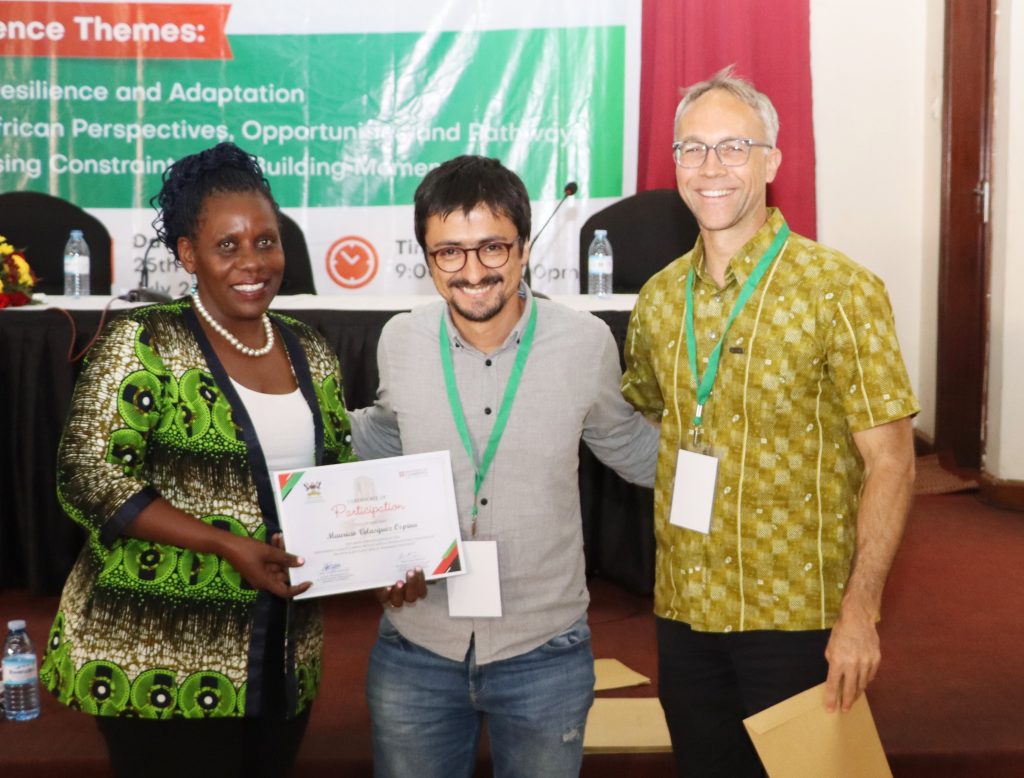
Panel discussions covered a range of topics. Panel One, chaired by Prof. Namaalwa, included debates on climate change politics, data, and justice. Panel Two, led by Solomon Olum, focused on land, natural resources, and livelihoods, with discussions on gender dynamics, carbon hegemony, and conservation agriculture. Panel Three, chaired by Arthur Oworo, explored culture and climate change, with presentations on literature, disaster risk reduction, and indigenous knowledge.
Day Two Featured Panel Four, chaired by Laury Ocen, which examined environmental hazards and social vulnerability, including studies on ecosystems, biodiversity, and the impacts of climate change in East Africa. Panel Five, led by Irene Anying, presented research on local climate knowledge and adaptation practices, while Panel Six, chaired by Adam Branch, addressed land, displacement, and ecology, featuring discussions on refugee self-reliance, land tenure, and sustainable development.
The conference successfully fostered a multidisciplinary dialogue on climate change, emphasizing the need for collaborative and context-specific solutions to address the challenges facing East Africa and beyond.
Communiqué: Key Takeaways and Resolutions from the Conference
The conference addressed several critical issues, providing clear resolutions for tackling climate change in East Africa. A major focus was the pivotal role of academia in shaping climate adaptation and resilience strategies for Africa.
Universities and research institutions were urged to lead by developing curricula and research agendas that incorporate African perspectives and solutions. This includes supporting civil society organizations (CSOs) with accessible information and fostering collaborative actions. There was a strong call to mainstream climate change across all academic disciplines, advocating for interdisciplinary approaches and ensuring that all fields, including the humanities, contribute to climate solutions.
The importance of evidence-based climate action was emphasized. It was highlighted that research should inform decision-making processes to ensure that interventions are grounded in solid evidence. This approach is crucial for implementing effective strategies to address climate change challenges.
The conference also underscored the need for research to be deliberate and intentional in influencing policy and practice. Researchers were encouraged not only to generate evidence but also to actively engage in refining and rebutting existing policies and practices. This focused effort aims to ensure that research findings contribute directly to improving climate policies and practices.
Researchers were urged to contribute to climate change mitigation efforts through targeted research that provides actionable insights and solutions for reducing greenhouse gas emissions and mitigating climate impacts. Additionally, there was a call for researchers to provide evidence-based results that support both national and international climate policy processes, including the Nationally Determined Contributions (NDCs). This will ensure that climate strategies are informed by the latest research findings.
Academia is expected to play a proactive role in supporting policy and strategy development. Researchers were urged to align their work with policy processes, offering valuable data and analysis to shape and refine climate strategies. This commitment is crucial for bridging the gap between research and practical climate action, ensuring that policies are effective and grounded in robust scientific evidence.
The conference also emphasized the urgent need to realign global climate strategies to better address African realities. By integrating local knowledge, mainstreaming climate issues across disciplines, enhancing collaboration between academia and practitioners, and valuing cultural perspectives, participants laid out a comprehensive roadmap for effective climate action in East Africa. Immediate and sustained efforts are required to implement these resolutions and address the climate crisis effectively.
Local knowledge and perspectives were highlighted, with the conference stressing that societies affected by climate change should not only be seen as victims but also as repositories of valuable indigenous knowledge. Challenging conventional notions of climate change and integrating local insights is essential for developing more effective and contextually relevant solutions.
Climate change was recognized as a cross-cutting issue impacting various sectors of society. The conference underscored the necessity of addressing climate change across political, economic, social, and scientific fields. Comprehensive engagement from all academic disciplines, including the humanities, is vital. Integrating diverse perspectives will ensure a holistic approach to tackling climate change and its multifaceted impacts.
Sustainable charcoal practices were identified as a critical area for environmental conservation and local livelihoods. The sub-region was highlighted as a key area for implementing such initiatives, emphasizing the need to mitigate deforestation and support community well-being.
Participants were encouraged to become proactive climate change activists, advocate for climate considerations in budget plans, and integrate these issues into everyday practices. Effective climate action requires collaboration between academia and CSOs to create and implement meaningful policies and initiatives.
Communication strategies were addressed, with a focus on using vernacular languages to effectively communicate climate change. This approach is crucial for bridging the gap between universal and local understandings, making climate information more accessible and relevant to diverse communities.
The conference stressed the need for a critical approach to data justice and climate modeling. There was a call for examining climate models and data with consideration of historical injustices, ensuring they inform policies and practices thoughtfully. Caution was advised to avoid perpetuating inequalities or misrepresenting local conditions.
Cultural perspectives and environmental justice were also highlighted. Cultural values and traditional knowledge play a crucial role in conserving natural resources and promoting environmental sustainability. The rich content of oral culture can offer valuable insights for developing effective climate change responses and resilience strategies.
Jane Anyango
Principal Communication Officer
You may like
-


Makerere University and Partners Celebrate INSSPIRE Project Achievements in Evidence-Based Higher Education on Food Systems and Climate Action
-
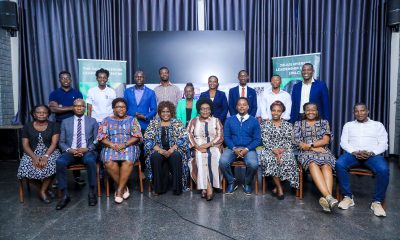

JNLC and UNDP Host Two-Day Community Innovation Showcase Featuring Impactful Alumni Projects
-


JASH2025 wraps with the 23rd Matthew Lukwiya Memorial Lecture and Kampala Declaration Statement
-
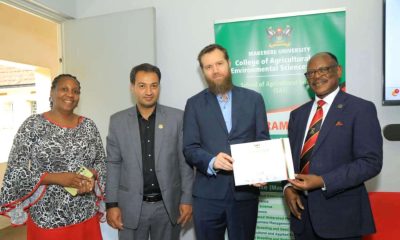

Vice Chancellor Closes International Conference on Food Systems Transformation for Climate Action
-
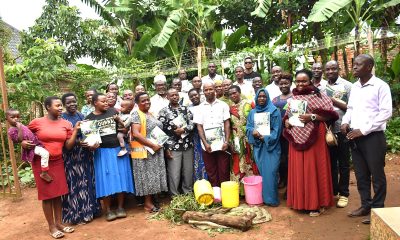

RUFS Project Team Trains Smallholder Farmers in Mbale City in Smart Agronomic Practices
-


Prof. Sarah Ssali commends Makerere University’s longstanding relationship with the Mastercard Foundation
Agriculture & Environment
Strengthening Capacity and Shaping Policy: Makerere University Reviews Progress of MERIT and Environmental Risk Research Programs
Published
2 weeks agoon
November 18, 2025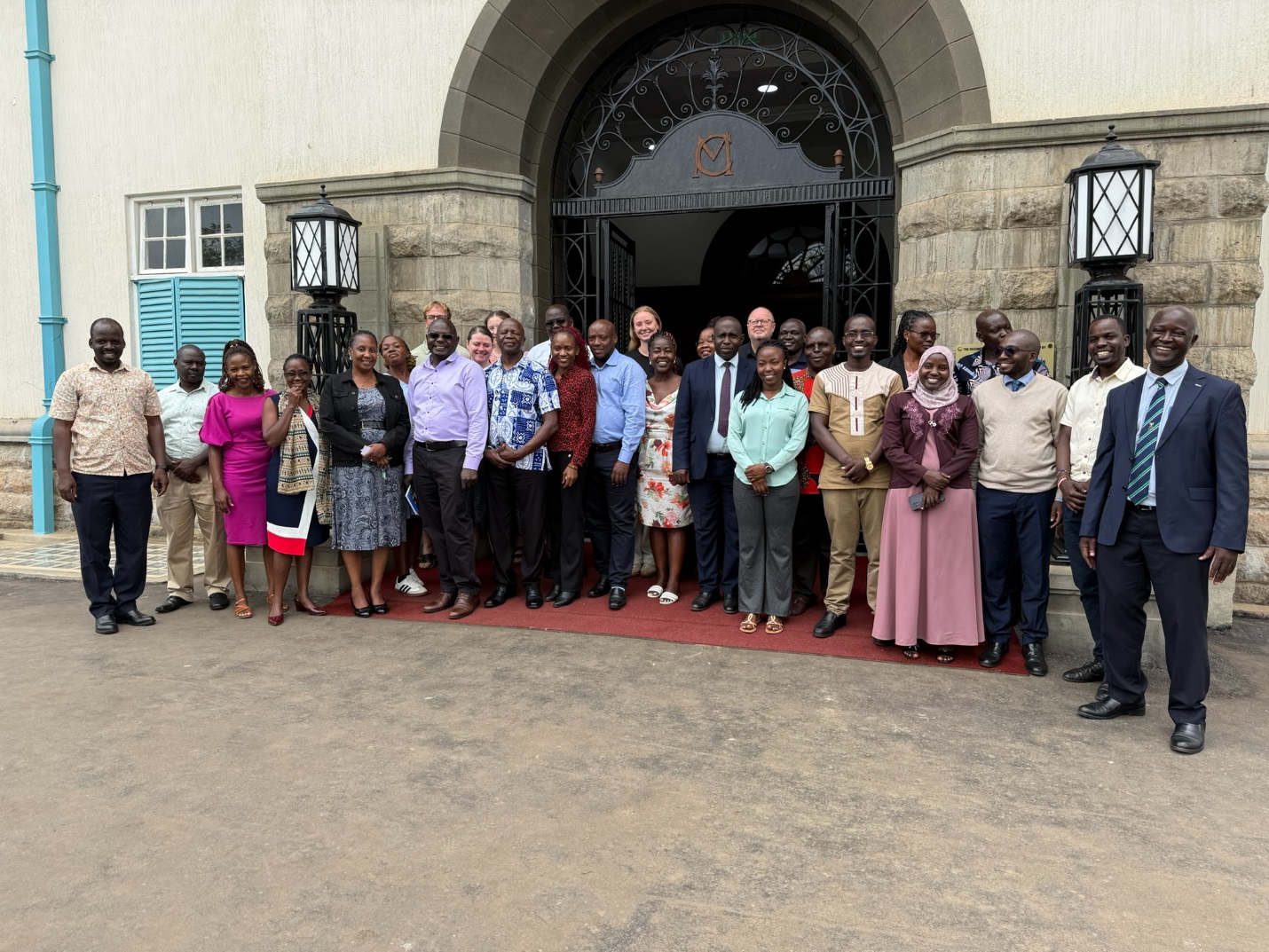
Makerere University, this week, through the College of Agricultural and Environmental Sciences (CAES), hosted a comprehensive impact review of the Environmental Risk Management Under Increasing extremes and Uncertainty (MERIT) Project, bringing together faculty, researchers, students, and partners from Ugandan and Norwegian institutions. The discussions highlighted the transformational impact of collaborative research, student engagement, and capacity development in shaping policy, strengthening community resilience, and advancing Makerere’s contribution to national development.
A Cross-Continental Partnership Driving Change
The MERIT Project, focusing on Environmental Risk Management and the Increasing Extremes and Uncertainty, is a five-university collaboration funded by the Norwegian Agency for Development Cooperation (NORAD) under the Norwegian Programme for Capacity Development in Higher Education and Research for Development (NORHED) programme. The project, which runs from 2021 to 2026 (with a one-year extension due to COVID-related delays), seeks to enhance mutual collaboration between universities in Sub-Saharan Africa and Norway. The project grant is worth 20 million Norwegian kroner and is being implemented across four Universities, namely, Makerere University, Uganda Martyrs University, University of Dar es Salaam, and Haramaya University in Ethiopia, with a strong involvement of the Norwegian University of Science and Technology (NTNU) and the Western University of Science and Technology.
Its core components include:
- Curriculum review and development
- Staff and student training (Master’s and PhDs)
- Joint research and publications
- Community-based environmental risk interventions
- Student and staff exchange programs
- SDG integration and gender mainstreaming
So far, 20 staff and 15 mainstream students have benefited from and participated in the project initiatives, with 13 Master’s and 2 PhD candidates progressing through specialised training in environmental risk management, geohazards, and disaster risk studies.
Student Research Driving Evidence-Informed Policy and Practice
The MERIT and NORHED-supported projects have empowered graduate students and early-career researchers at Makerere University to undertake cutting-edge research that directly informs Uganda’s environmental risk management agenda. Although the full findings are yet to be published, the projects have catalyzed important scientific inquiry in several key areas.
Some of the students are currently working on:
- Improving environmental data and modelling to strengthen flood forecasting, hydrological planning, and climate-related risk assessment in high-risk regions.
- Assessing disaster risk reduction practices at the local government level and examining how global frameworks such as the Sendai Framework and the SDGs are being implemented on the ground.
- Exploring nature-based solutions, including sustainable approaches to land restoration, riverbank stabilization, and ecosystem protection.
- Studying climate impacts on agriculture and food systems, with a focus on supporting vulnerable households and smallholder production.
- Mapping urban ecological systems, including forest patches and carbon stocks, to guide sustainable urban planning.
- Documenting community-led adaptation strategies and traditional ecological knowledge to strengthen locally grounded resilience approaches.
- Evaluating the role of non-state actors, such as NGOs and community groups, in environmental risk reduction and recovery efforts.
Together, these research efforts are generating practical insights that can shape policy development, inform district and national planning, and strengthen community resilience. The projects are also building a new cohort of scientists equipped with the skills to bridge academic work with real-world environmental management challenges.
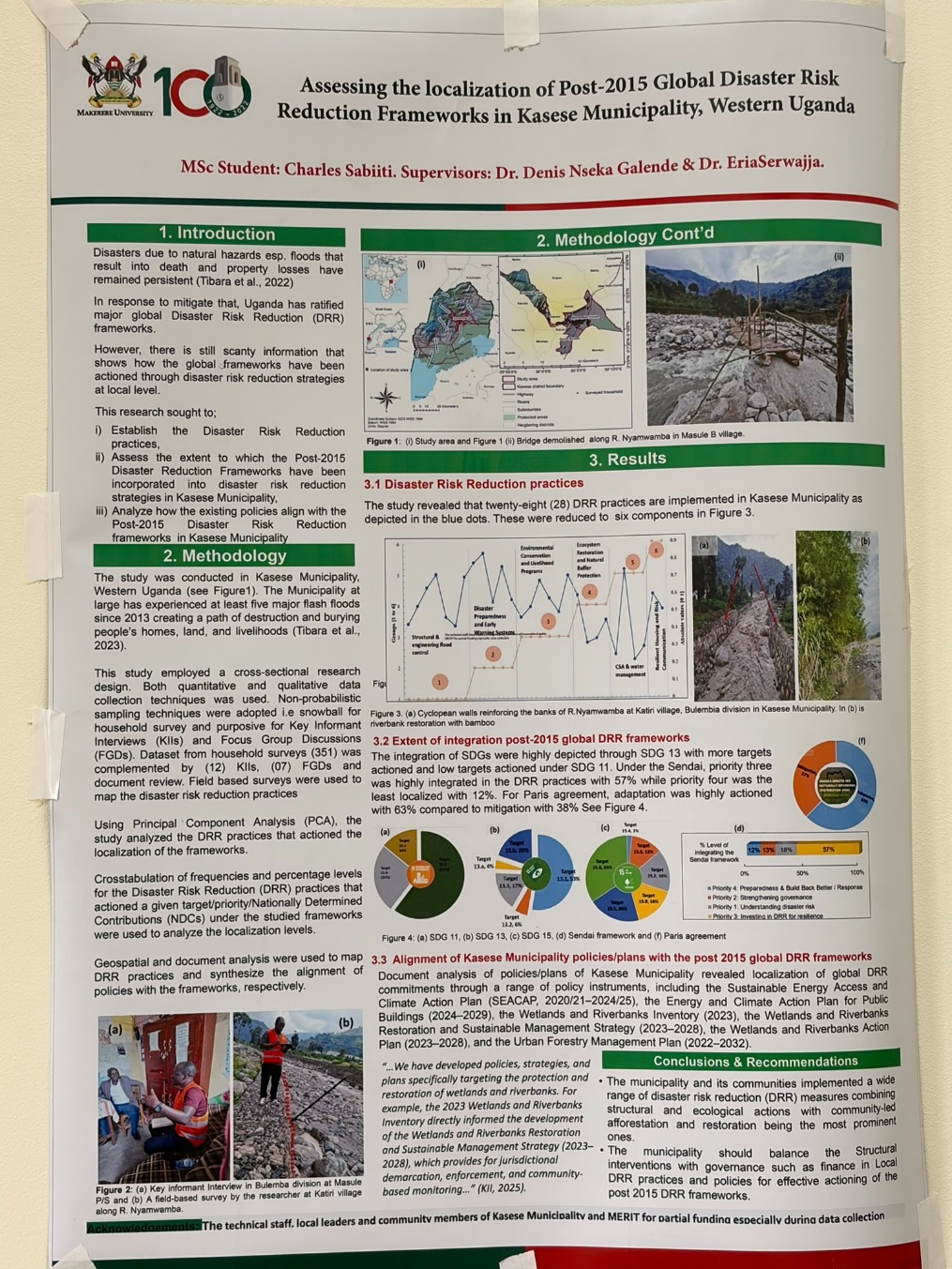
Community Engagement and Local Knowledge at the Centre
The Environmental Risk Management component of the MERIT project has contributed to impactful knowledge and research vital for community interventions in highland and mountainous areas such as Mbale, Bududa, Sironko, and other districts that are prone to environmental risks, like landslides, flooding, and geohazards.
Key community-focused activities highlighted in the meeting included digitizing households in high-risk areas, using remote sensing and GIS to develop contextual warning systems, documenting and integrating traditional ecological knowledge, assessing community resilience and vulnerabilities, and generating data for localized environmental risk planning. Such engagements not only strengthen community preparedness but also provide students with rich field experience and data for their research.
Student Exchanges and a Global Learning Experience
In an Interview, Prof. Harald Aspen,the Head, Department of Geography and Social Anthropology at NTNU, and Dr. Charlotte Nakakaawa Jjunja, the administrative co-ordinator of the project at NTNU, noted that, so far, five students from NTNU are currently undertaking research and internships in Uganda, immersing themselves in local challenges and contributing to joint innovations. Ugandan students have also benefited from exposure to Norway’s systems, creating a two-way flow of knowledge and experience.
They further noted that the exchange program, supported by the CostClim project under the Norpart project, helps students appreciate the complexities of implementing SDGs in diverse contexts, turning theory into practical, actionable insights.
Strengthening Makerere’s Institutional Capacity
Makerere University has benefited significantly from the MERIT collaboration. In his remarks, Prof. Yazhidi Bamutaaze, the Deputy Principal, CAES, noted that the College had acquired a Land Cruiser to support fieldwork, funding for curriculum review and SDG evaluation, support for gender mainstreaming initiatives, research funding for senior academic staff, enhanced visibility through joint publications and innovations, competence development trainings for college staff and students and co-supervision arrangements among others.
Such partnerships reinforce the University’s strategic commitment to cutting-edge research, global collaboration, and community impact.
Sustainability, Student Energy, and the Path Forward
A major segment of the meeting focused on the operationalization of sustainability principles across the University. Dr. Paul Mukwaya, the Head, Department of Geography, Geo-informatics and Climatic Sciences at CAES, emphasized leveraging student enthusiasm, building sustainability clubs, and avoiding passive “mainstreaming” in favour of proactive sustainability actions.
Key recommendations included:
- Training students on how to develop policy briefs
- Ensuring every student project reflects the SDGs
- Creating a central repository or map of all student work
- Strengthening academic supervision to grow student confidence
- Building systems that ensure research outputs influence actual practice
Dr. Mukwaya further highlighted the importance of student self-confidence, continuous reflection, and mentorship in shaping future academic and professional careers through the MERIT project.
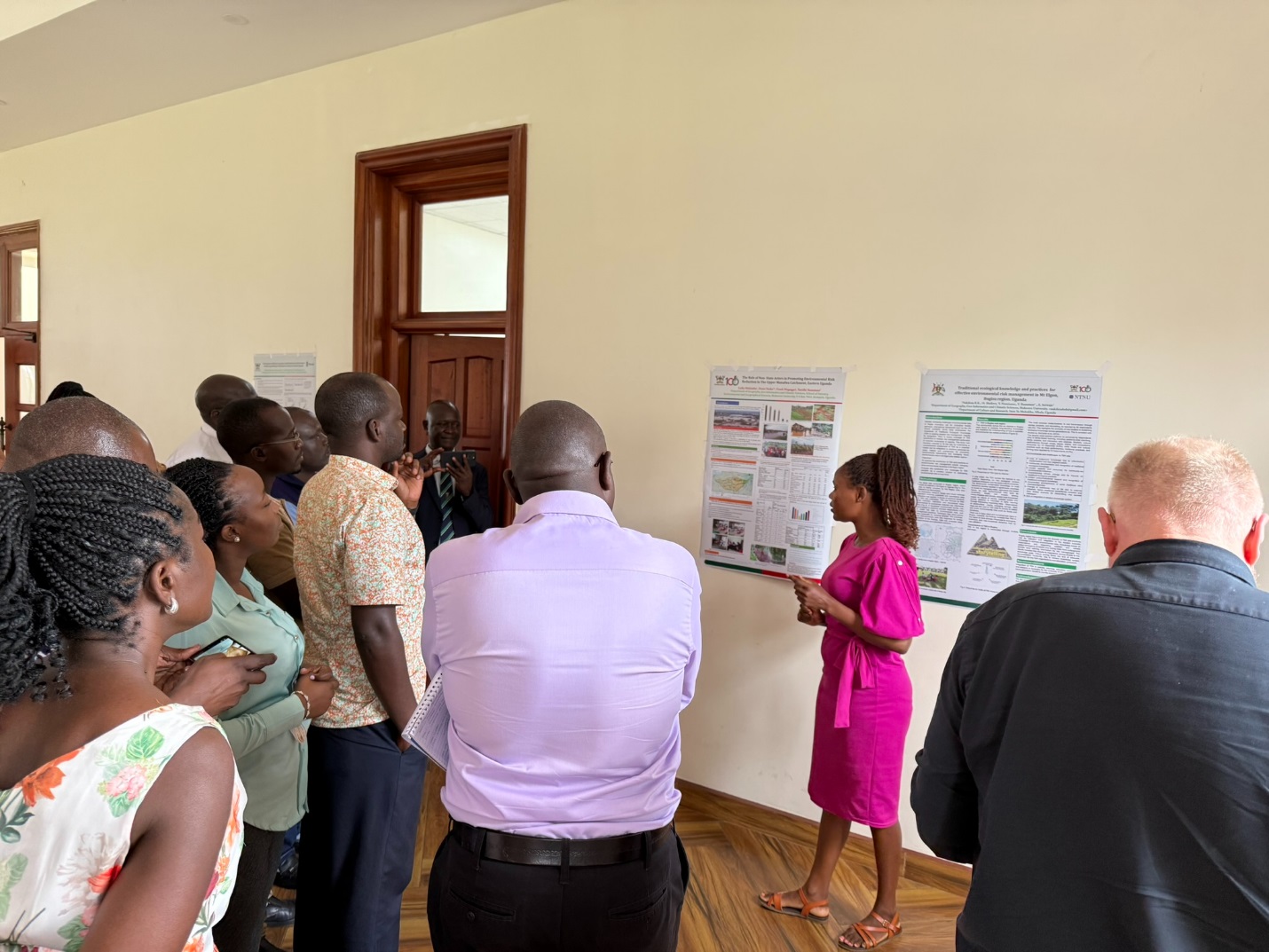
Challenges and Opportunities
While the project has achieved significant milestones, several challenges remain, such as administrative and IT-related delays, balancing donor expectations with academic timelines and bureaucracies, maintaining strong collaborations across multi-university partnerships and ensuring sustainability initiatives are integrated and action-driven
Conclusion: A Growing Ecosystem of Impact
The review meeting affirmed that the MERIT and related research programs are not just academic exercises; they are shaping the future of environmental resilience, policy development, and capacity building in Uganda. The University’s commitment to student growth, collaborative innovation, and evidence-based policy influence underscores the central role Makerere continues to play in national and global development conversations.
As the project enters its final years, the focus now shifts to consolidating gains, scaling successful interventions, and ensuring that the research produced today continues to transform lives tomorrow.
Caroline Kainomugisha is the Communications Officer, Advancement Office, Makerere University.
Agriculture & Environment
SFTNB-MIIC Partnership Nurtures Entrepreneurial Learners & Change Agents
Published
3 weeks agoon
November 12, 2025By
Eve Nakyanzi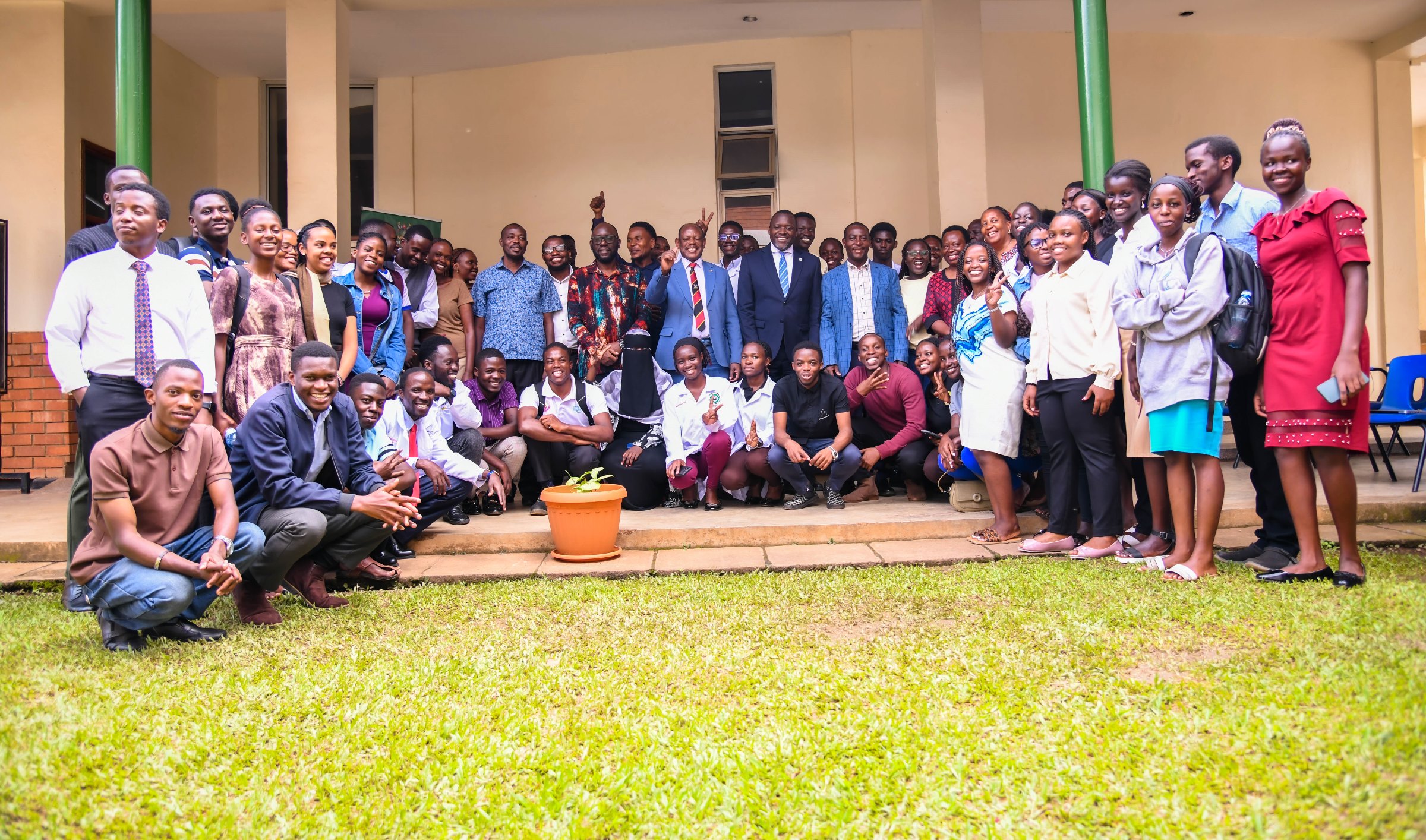
The School of Food Technology, Nutrition and Bio-Engineering (SFTNB), in partnership with the Makerere Innovation and Incubation Center (MIIC), held the third edition of its Entrepreneurship Exhibition on 12th November 2025, bringing together student innovators to showcase a semester’s worth of creativity, research, and product development. The exhibition is a key milestone under the SFTNB Entrepreneurship Program – Cohort 3, a structured model that guides students through the full innovation journey — from idea generation and business training to prototyping, testing, and market access. Supported by MIIC with a UGX 7 million innovation fund, the program has empowered more than 60 students across 15 innovation groups to develop practical, sustainable, and market-ready solutions in food technology, nutrition, and engineering. This year’s exhibition provided a platform for students to present their prototypes, share their business concepts, and engage with university leaders, industry partners, and potential investors, further strengthening Makerere University’s commitment to nurturing a new generation of entrepreneurial change-makers.

The Vice Chancellor Prof. Barnabas Nawangwe commended the School of Food Technology, Nutrition and Bioengineering for nurturing innovations that reflect both creativity and commercial potential. He observed that many of the student products exhibited could be patented, scaled up, and exported, provided their shelf life, packaging, and branding are further improved. Emphasizing that innovation must go beyond classroom projects, Prof. Nawangwe urged students to view their work as viable enterprises capable of transforming communities and creating employment. He also pledged the university’s support in helping innovators register companies and access product certification, even suggesting that Makerere could subsidize related costs. He further called for closer collaboration with economists and marketers to assess product feasibility, adding that the university’s innovation ecosystem should include a dedicated marketing unit. He concluded by reminding students that their ideas hold the power to reshape Uganda’s economy and uplift livelihoods. “Don’t think what you’re doing is small. You’re contributing to transforming a whole society,” he said, adding that “You will not need to go out looking for jobs; you will be creating them.”
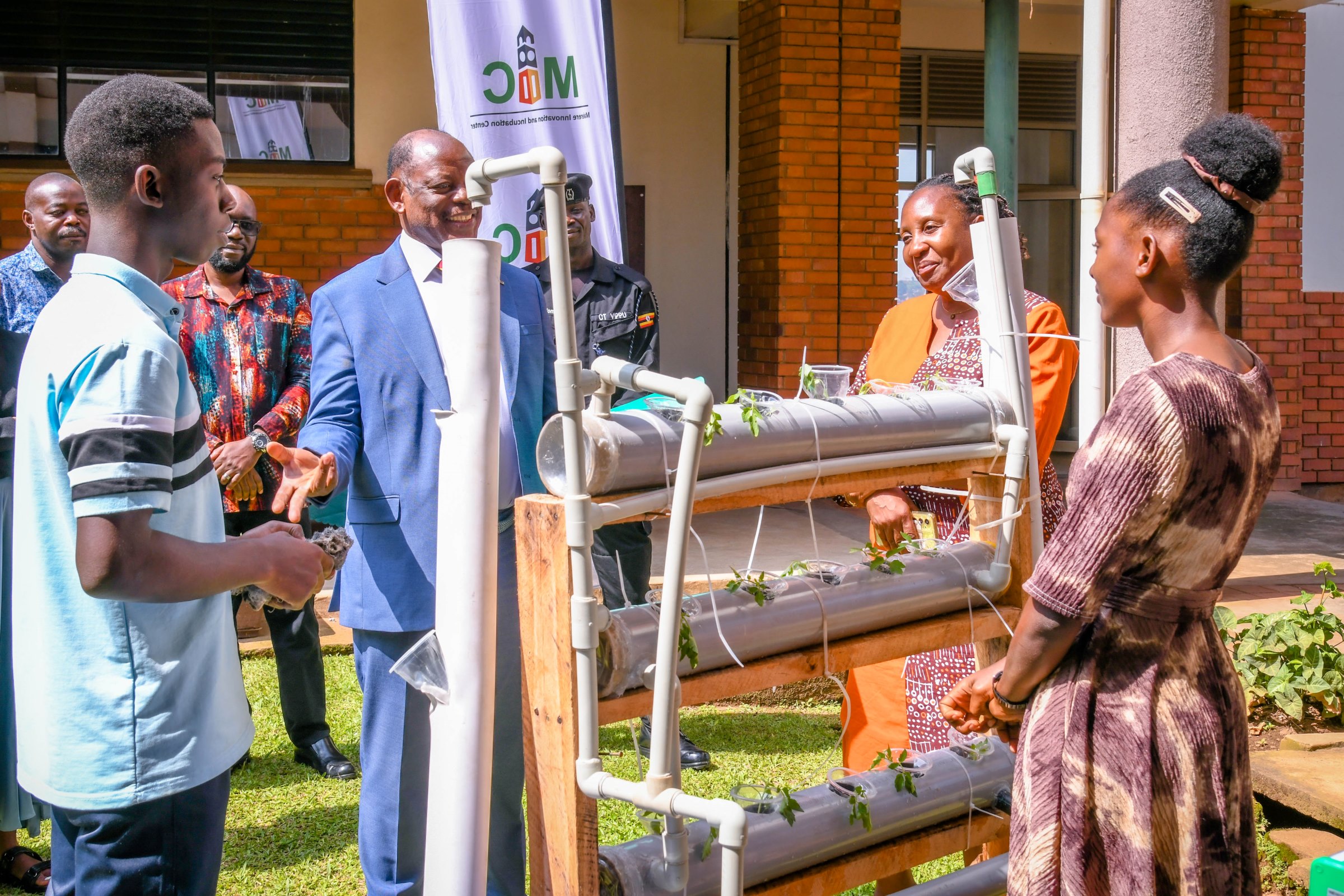
The Dean of the School of Food Technology, Nutrition and Bioengineering, Prof. Julia Kigozi, expressed heartfelt gratitude to the Vice Chancellor and the university management for their continued support toward the school’s initiatives. She noted that the exhibition was a reflection of the hard work and creativity of students who are being equipped not only with technical skills but also with the mindset to innovate and contribute meaningfully to industry. Prof. Kigozi highlighted that the school’s projects have significant potential for commercialization and industry collaboration, made possible through ongoing support and funding. She reaffirmed the school’s commitment to nurturing practical, industry-relevant training that empowers students to apply their knowledge beyond the classroom. “When you see the students out here working hard, they are very encouraged,” she said, adding that “what they are doing demonstrates a lot of potential for products to go out for commercialization and for creating training platforms that can support industry in various ways.”
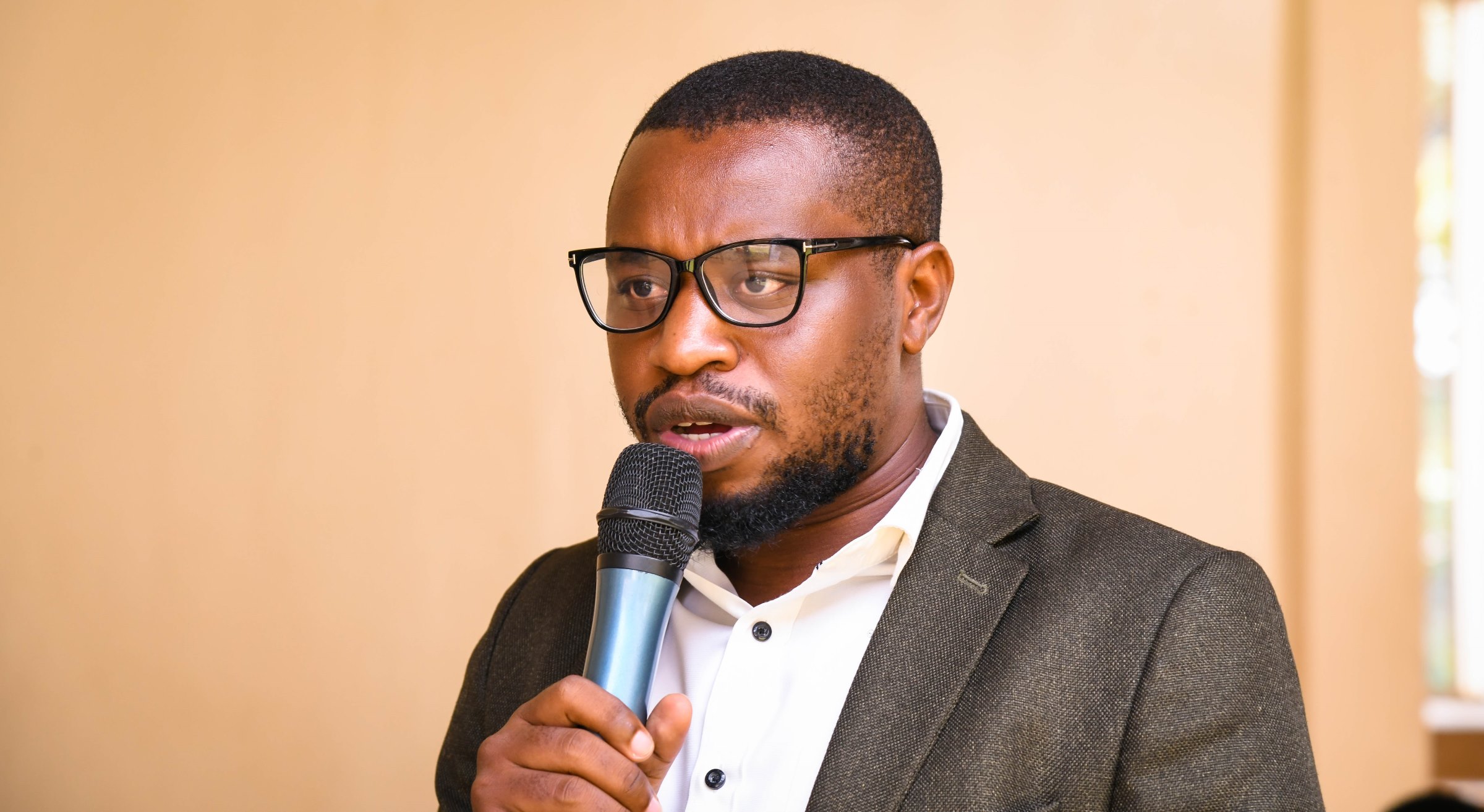
Mr. Gilbert Buregyeya, Programs Lead of the Makerere Innovation and Incubation Centre (MIIC), commended the School of Food Technology, Nutrition and Bioengineering for its commitment to innovation and practical learning. He noted that the partnership between MIIC and the school has been instrumental in redesigning the curriculum to emphasize commercialization and market readiness of student projects. Highlighting ongoing efforts to make the certification process more accessible for young inventors, he revealed discussions with the Uganda National Bureau of Standards (UNBS) aimed at developing flexible, lower-cost certification pathways that allow students to test their products in the market.
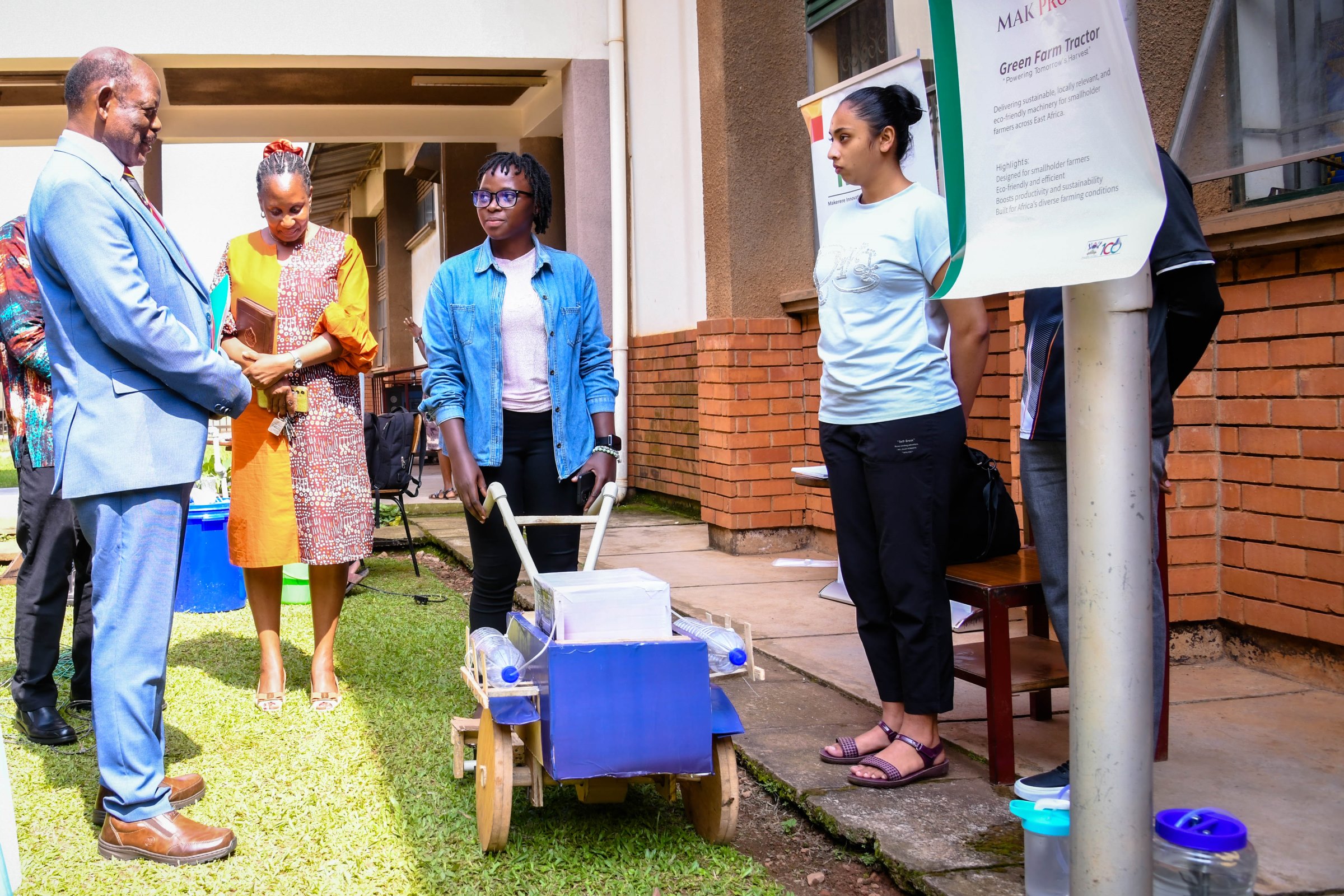
Mr. Buregyeya further emphasized the importance of cross-college collaboration within the university, pointing to successful engagements with other colleges such as COFA and Queensland College. He expressed optimism that Makerere’s innovation ecosystem will soon produce groundbreaking, market-ready products capable of competing globally. “We are happy that the journey is underway this semester,” he said, adding that “our goal is to support young innovators to move from small markets to compete with the bigger ones outside, and to make certification and commercialization more attainable for students.”
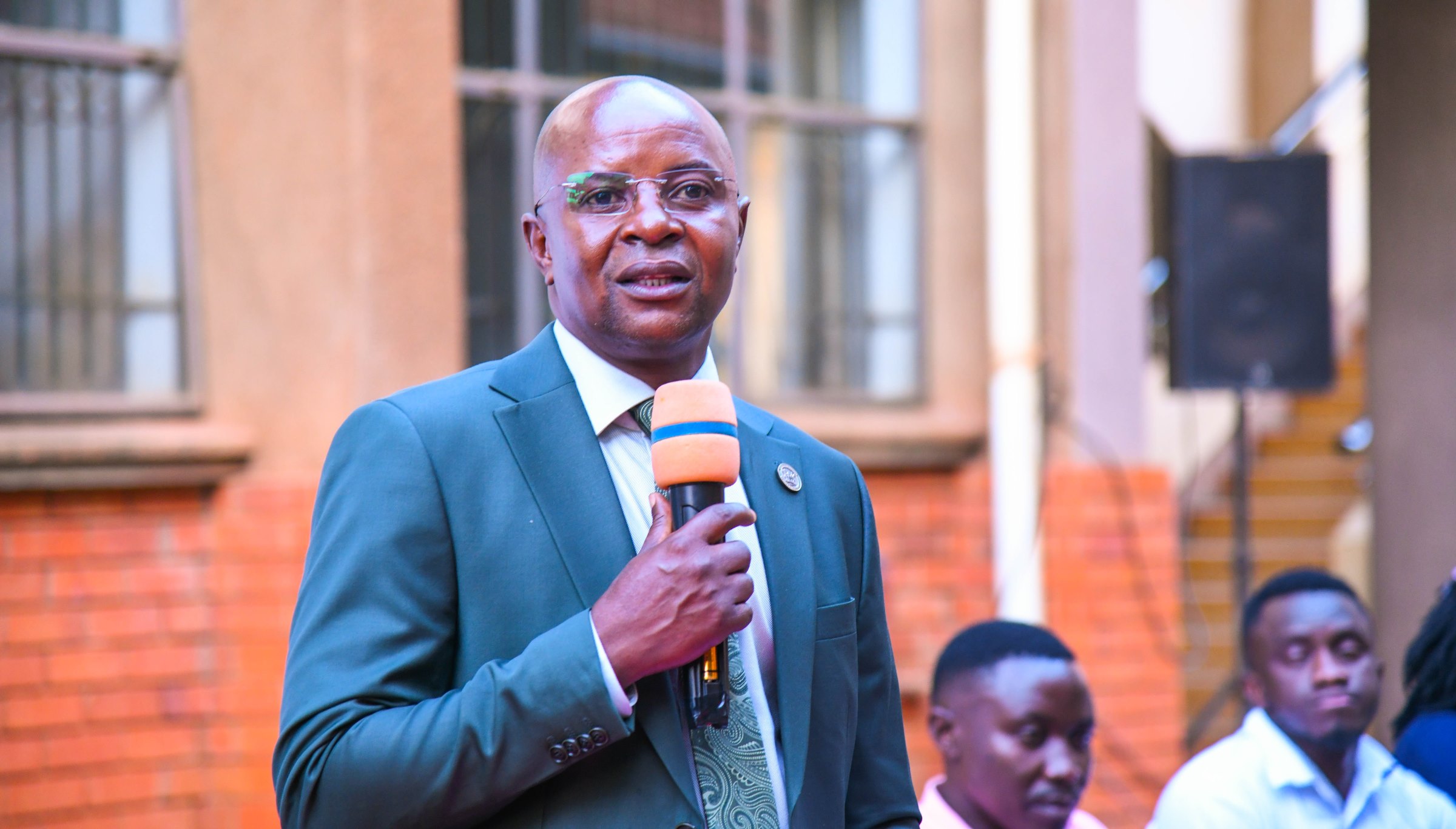
Representing the Deputy Vice Chancellor for Academic Affairs, the Principal of the College of Business and Management Sciences (CoBAMS), Prof. Edward Bbaale commended the School of Food Technology, Nutrition and Bioengineering for integrating innovation and entrepreneurship into academic training. He described the student exhibition as a celebration of “innovation, action, purpose and science that transforms,” noting that such initiatives align with national goals of value addition, sustainability, and community transformation. Prof. Bbaale emphasized that the showcased projects — spanning food, nutrition, and engineering — demonstrate how students are emerging as entrepreneurial learners and change agents addressing real-world challenges.
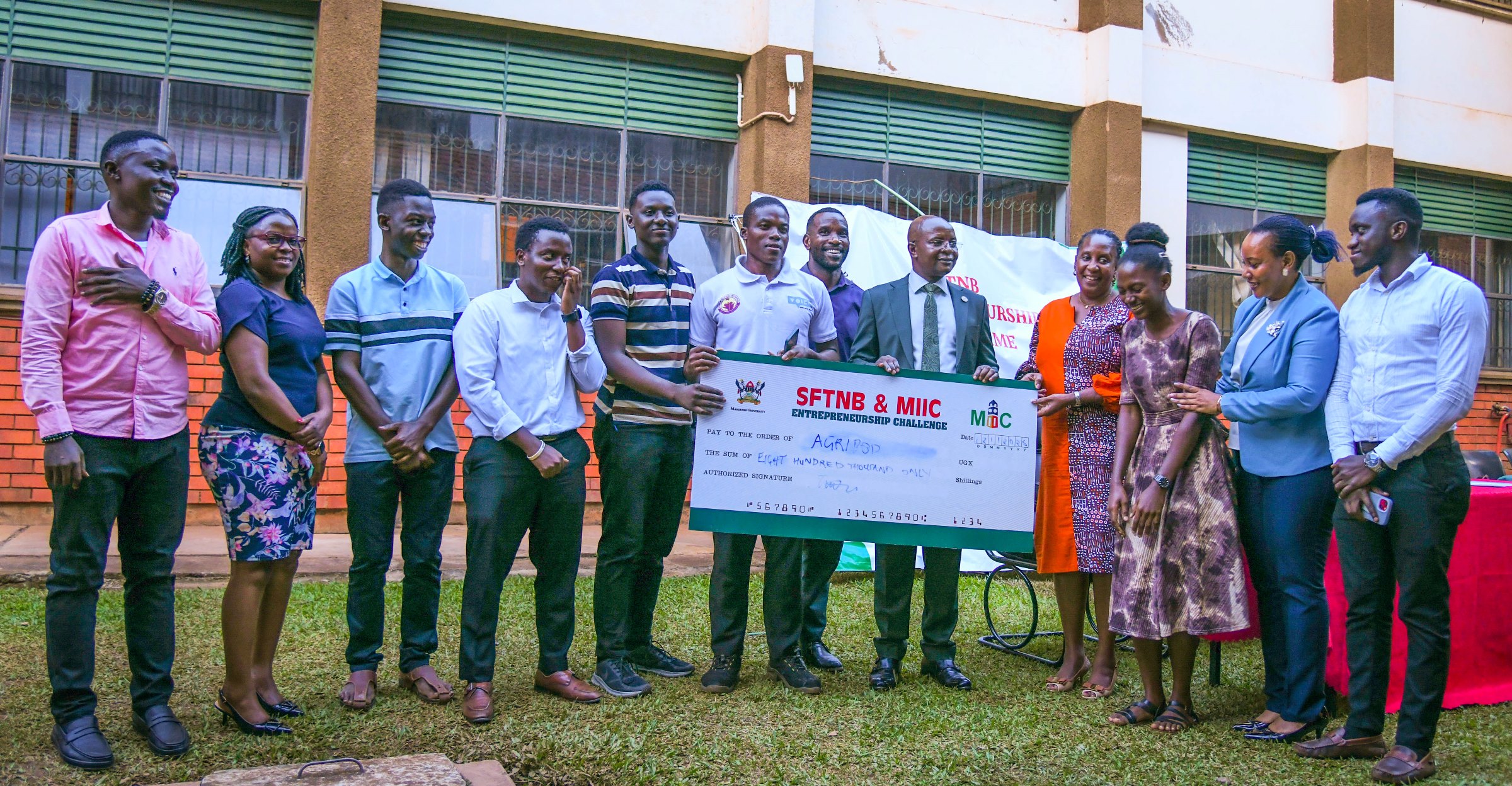
He acknowledged the Makerere Innovation and Incubation Centre (MIIC) for supporting student-led research and urged innovators to remain focused, ethical, and community-oriented in their ventures. Commending the mentors and staff for their guidance, he reaffirmed the university’s commitment to building a research-intensive, innovation-driven ecosystem that supports ideas from concept to commercialization. “Never involve yourself in a business when you are not serving a community problem,” he advised, adding that “you have shown resilience, creativity and passion — proving that innovation knows no bounds. The future belongs to those who are ready to build it.”
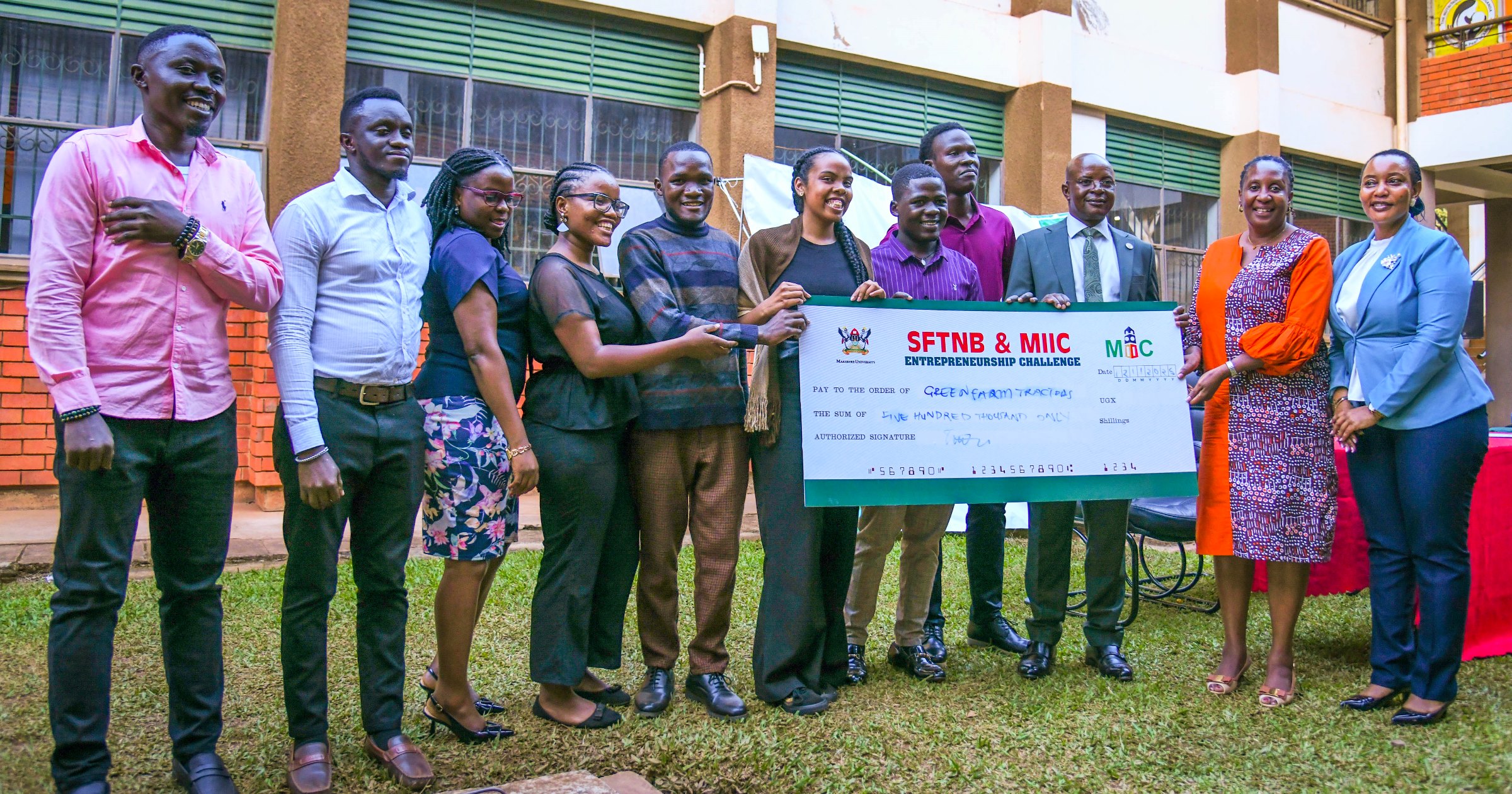
The exhibition concluded with the recognition of the top-performing student innovation groups, celebrating their creativity, technical skill, and market potential. Umoja Lacto Blend emerged as the Second Runner-Up, impressing judges with its unique product concept and strong value-addition focus. The First Runner-Up, Green Farm Tractor, showcased an innovative engineering solution designed to improve agricultural efficiency and accessibility for smallholder farmers. Taking the top spot was Agri Farm, whose outstanding innovation, clear business model, and readiness for market positioned them as the overall winners of the 2025 cohort. Their achievements reflected the high caliber of talent within SFTNB and the transformative potential of student-led entrepreneurship.
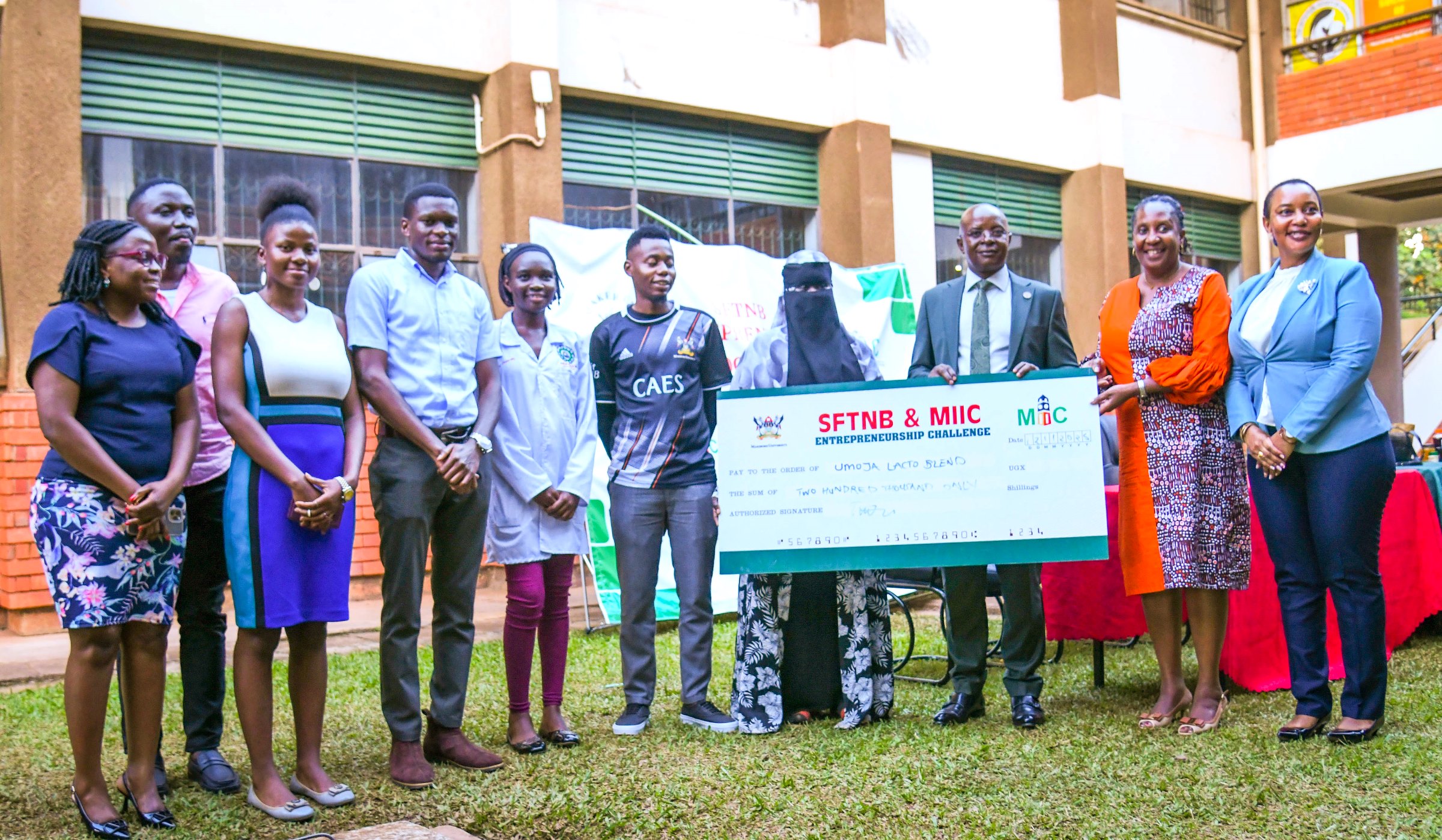
Agriculture & Environment
Vice Chancellor Closes International Conference on Food Systems Transformation for Climate Action
Published
1 month agoon
October 29, 2025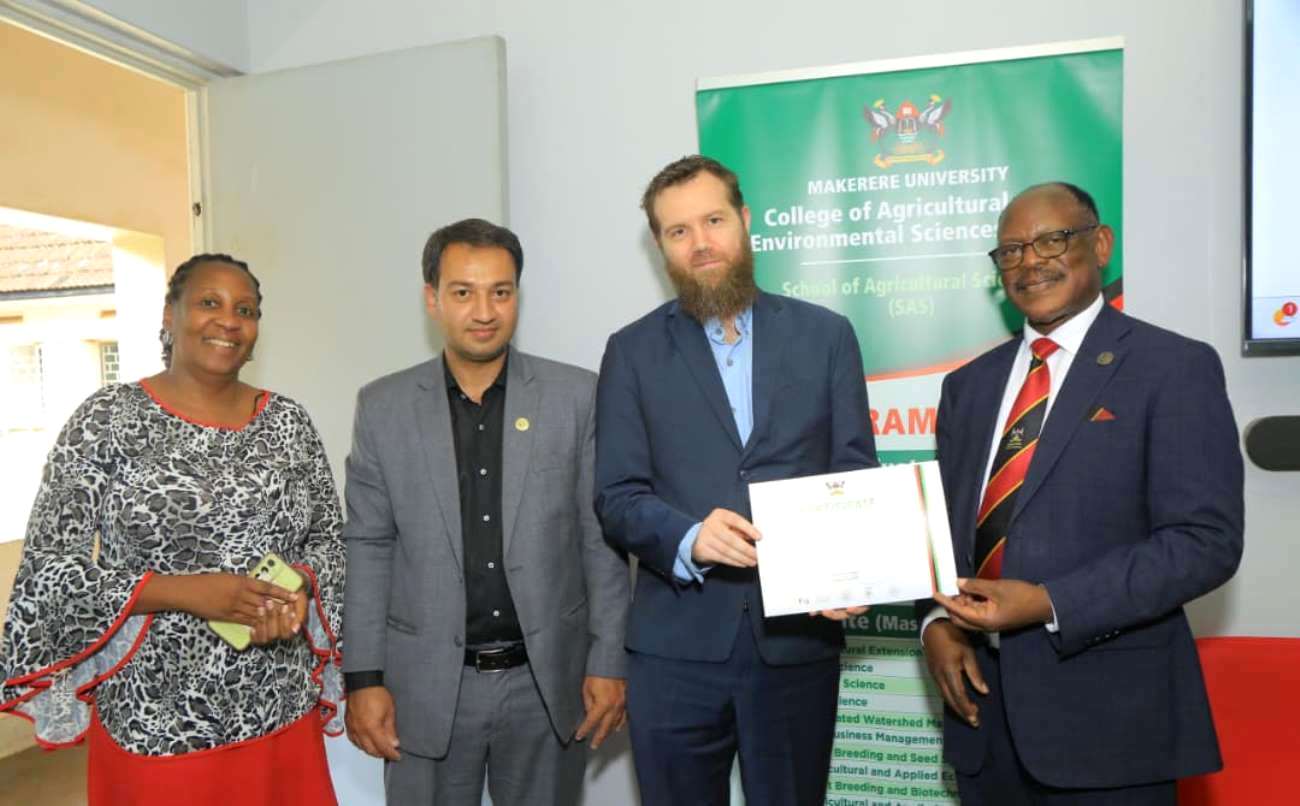
Certificates awarded to participants as Makerere reaffirms commitment to climate-smart agriculture
Makerere University has today October 29, 2025 closed the International Conference on Food Systems Transformation for Climate Action, with participants awarded certificates for their contribution and completion of the intensive two-day engagements. The conference brought together researchers, policymakers, students, and international partners to deliberate on how to transform food systems in the face of growing climate challenges.
Speaking at the closing ceremony held at the College of Agricultural and Environmental Sciences (CAES), Vice Chancellor Prof. Barnabas Nawangwe commended the organizers and participants for their active engagement and commitment to addressing challenges in food systems and climate change.
“This training has been very useful. Every conference I attend teaches me something new, and I can see that this has been a rich learning experience for everyone here,” said Prof. Nawangwe. “We must continue to innovate and work closely with smallholder farmers to ensure that even the smallest pieces of land are used productively. Technology, artificial intelligence, and affordable irrigation systems can make a real difference.”
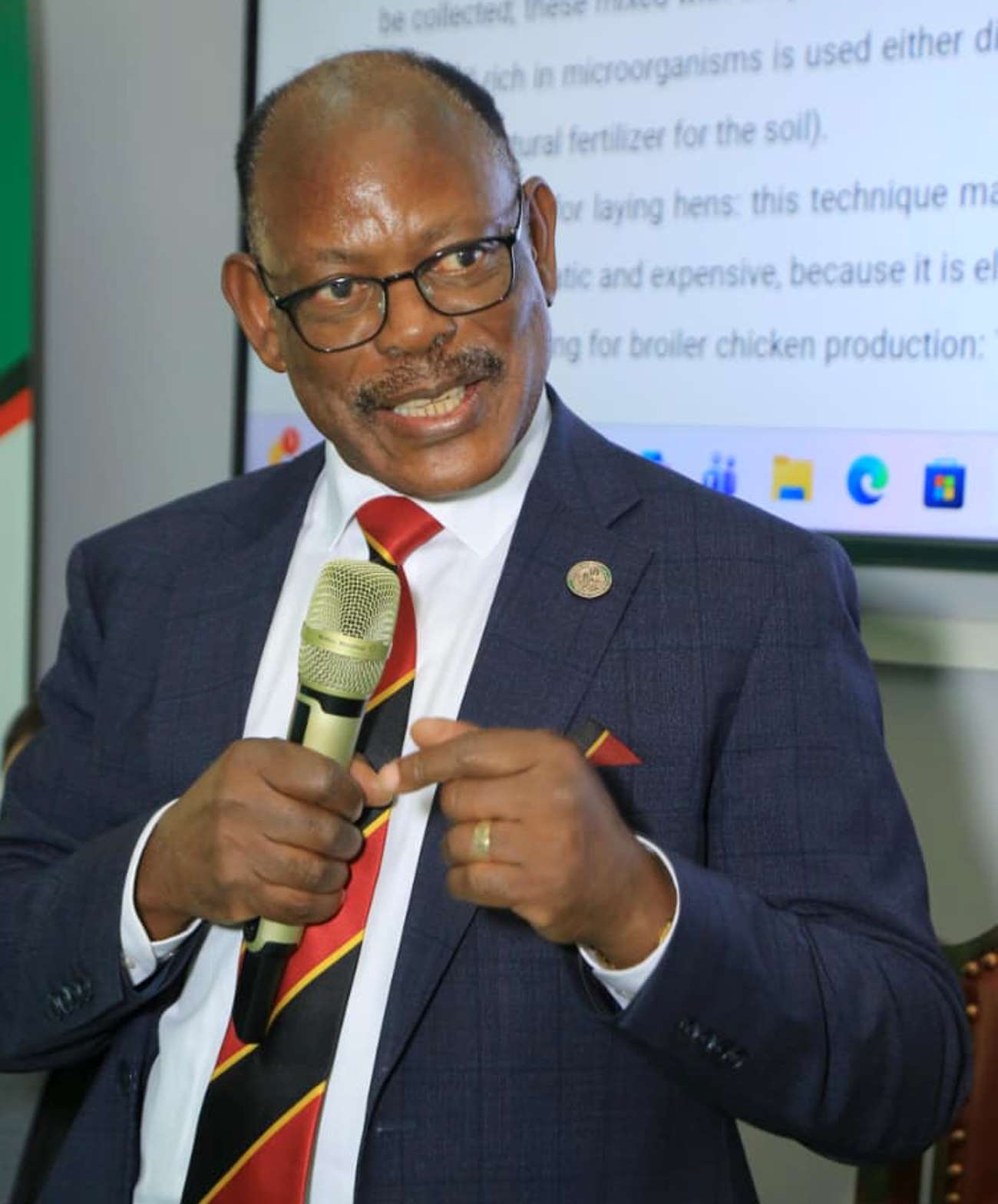
The Vice Chancellor emphasized the importance of turning university research into practical solutions that benefit communities, noting that Makerere’s scientists must go beyond publications to create commercial products and start enterprises that add value to their innovations.
“Our professors should not only retire on government pension but also on royalties from their innovations,” he added. “We must transform our research into products and services that create jobs and wealth.”
He further highlighted the importance of protecting intellectual property and promoting collaboration between universities and industries, drawing lessons from global examples such as Malaysia and China, where research and innovation have powered industrial growth.
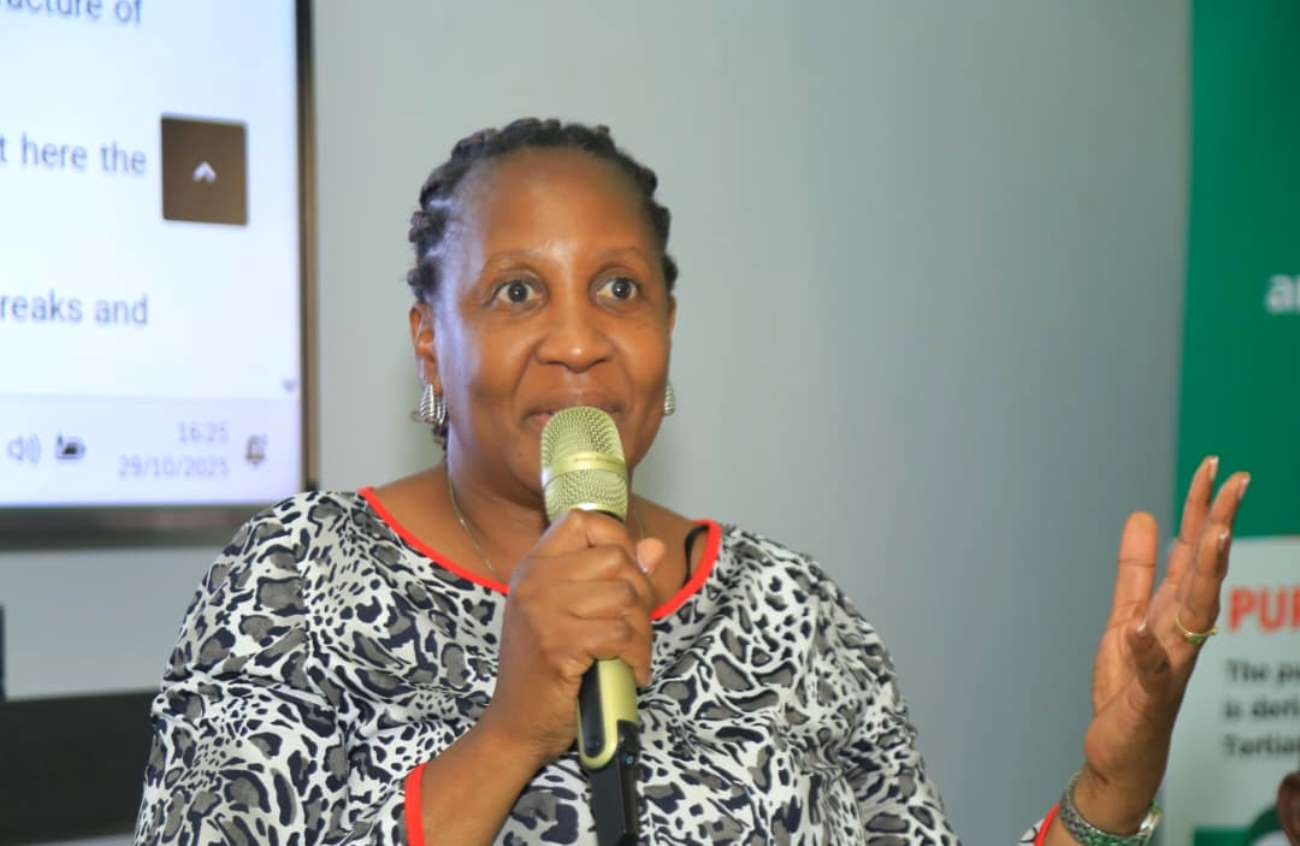
Representing the Principal of CAES, Dr. Julia Kigozi, the Dean of the School of Food Technology, Nutrition, and Bioengineering, appreciated the Vice Chancellor for gracing the conference and commended participants for their enthusiasm.
“We explored challenges, trends, and opportunities in food systems and climate change, and this conference has given our researchers and PhD students valuable insights,” she said. “It reminded us that while challenges are shared across countries, we can each start small and still make a difference.”
Dr. John Baptist Tumuhairwe, one of the conveners, emphasized the importance of integrating climate action into food systems transformation, noting that the conference had strengthened Makerere’s networks in food and agricultural sciences.
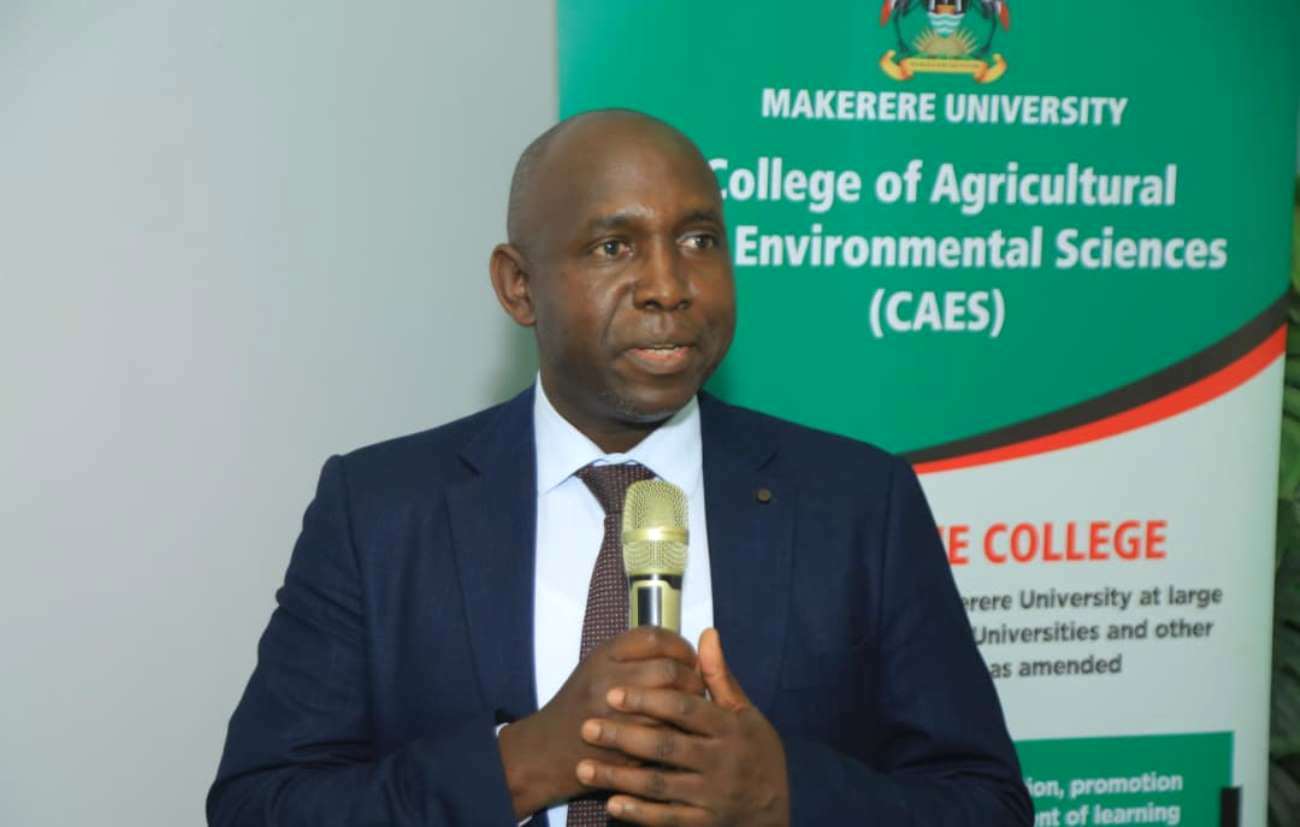
“This meeting has expanded our collaborations and reaffirmed the university’s leadership in advancing sustainable food systems,” he said. “It was also deliberate in engaging the youth, who are our next generation of innovators.”
On behalf of the OIC Standing Committee on Scientific and Technological Cooperation (COMSTECH), Dr. Haris Akram, the Program Manager, thanked Makerere University for hosting the international gathering and reiterated the need for continued collaboration.
“We must ask ourselves whether this workshop will make a difference in our lives and practices,” he remarked. “The real success lies in how we apply the knowledge gained to improve food security and sustainability.”
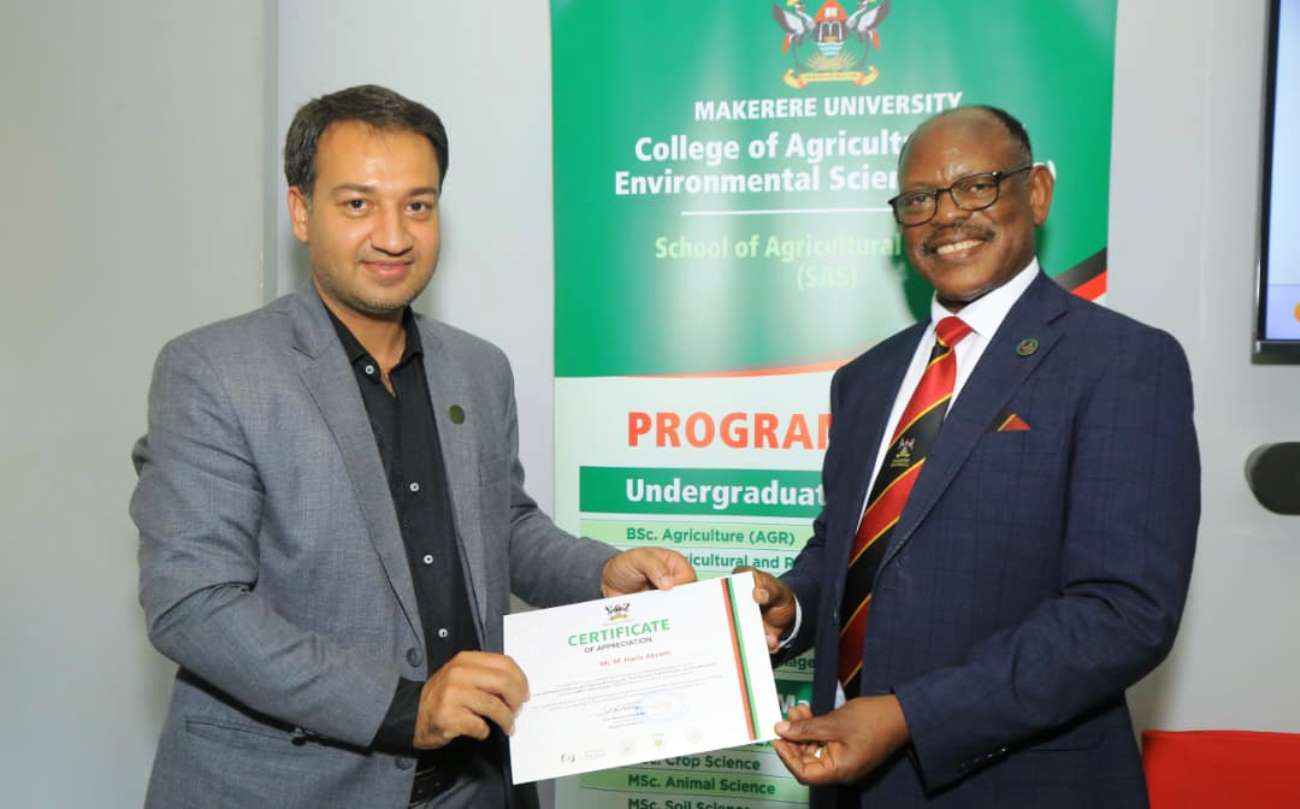
The conference, organized by Makerere University’s College of Agricultural and Environmental Sciences in partnership with OIC-COMSTECH, brought together experts from across Africa and Asia to share experiences on sustainable food production, agro-processing, and climate-smart innovations.
Officially closing the conference, Prof. Nawangwe in his remarks reaffirmed Makerere University’s commitment to leading research and innovation in agriculture, food systems, and climate resilience.
“Agriculture remains the backbone of our country and the most important driver of our future,” he concluded. “Let us put our heads and hands together to transform this sector and build a sustainable future for our people.”
Trending
-
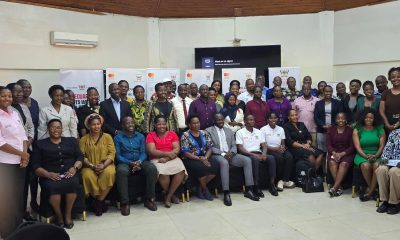
 General2 weeks ago
General2 weeks agoMakerere University officially commences implementation of its Mentorship Policy
-

 General6 days ago
General6 days agoIn Honor of the Life and Legacy of Mr. Francis Seletze Ngabirano-A Steady Hand through the Storms
-
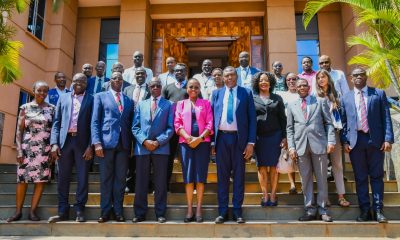
 Health4 days ago
Health4 days agoIDI launches the Sewankambo Training Program for Global Health Security in Africa
-

 Engineering, Art & Tech7 days ago
Engineering, Art & Tech7 days agoErasmus Exchange Prof.’s Mak Photo wins Poland National Prize
-
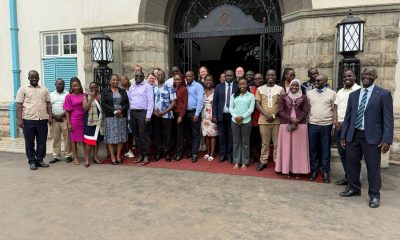
 Agriculture & Environment2 weeks ago
Agriculture & Environment2 weeks agoStrengthening Capacity and Shaping Policy: Makerere University Reviews Progress of MERIT and Environmental Risk Research Programs
